

WINTER 2022–2023 BABSONMAGAZINE PEOPLE OF BABSON / 9 BABSON & NEW BALANCE / 26 CENTENNIAL CAMPAIGN / 28 NEWS, NOTES, AND NODS / 32
Franchising PAGE 10
The Future of
Community is a powerful force. We saw that rsthand at Babson as we navigated the challenges of the pandemic. It was our community that sustained us and bound us together. And, it is our community of entrepreneurial leaders and learners that continues to motivate us.
This issue of Babson Magazine focuses on the future of franchising, which is a business model built on community. It fosters relationships between franchisors and franchisees, accelerates collaboration among franchise owners, and, at its best, builds a community of customers.
Franchising has been an integral part of my professional career—as a franchisor and franchisee, as an educator and author, and as a board member and administrator. Decades ago, people often dismissed franchising as an entrepreneurial pursuit, saying it was simply “buying a job.” However, as I’ve experienced from my earliest days co-founding Jiffy Lube to my current role as Planet Fitness’ chairman, franchising is the epitome of entrepreneurship.

One of the reasons I like franchising so much is that it allows you to scale your ambition as you deem appropriate. We had huge ambitions for Jiffy Lube, and franchising helped us grow the business into a worldwide brand. To be successful, franchising—whether it’s Jiffy Lube, or Dunkin’, or Edible Brands— requires the same entrepreneurial skills and mindset that we teach at Babson.
It’s no surprise that Babson has long been a major supplier of franchising talent, as the number of alumni who participate in the franchising ecosystem in some capacity is impressive and inspiring. That makes me particularly proud of the College’s new Tariq Farid Franchise Institute, which brings much needed academic focus and research to a proven business model made to scale corporate and social innovations.
In these pages, we explore franchising’s future (starting on Page 10) with Ab Igram MBA’96, the institute’s executive director, and Somia Farid Silber ’15, the president of Edible Brands and a Babson trustee. You also can read more about my franchising journey, as well as some of the alumni thriving in franchising.
Babson’s franchising roots run deep and have created a natural, built-in community to support and expand our efforts to develop the next generation of franchise entrepreneurs.
Stephen Spinelli Jr. MBA’92, PhD
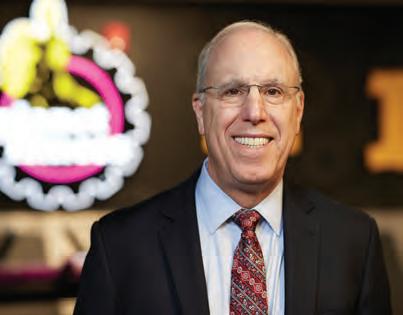
FROM THEPRESIDENT
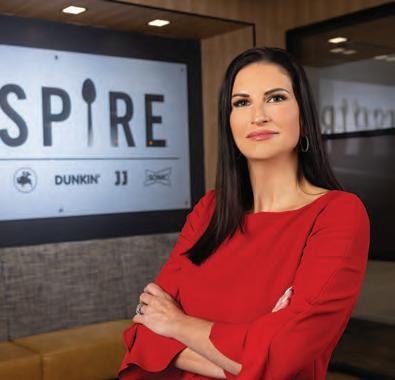
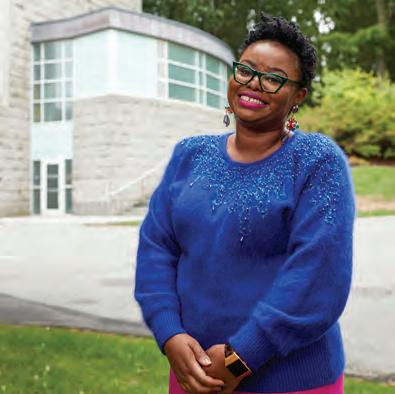
Babson Magazine (USPS 898-140) is published by Babson College, 231 Forest Street, Babson Park, MA 02457-0310, three times a year, in the spring, summer, and winter. Copyright 2022 by Babson College. Editorial office: Babson Park, MA 02457-0310. Send address corrections to advancement_services@babson.edu, or call +781-239-4044. BABSON MAGAZINE STAFF / Vol. 89, No. 2 EDITOR Eric Beato PUBLISHER Kerry Salerno, chief marketing officer CREATIVE MANAGEMENT Cheryl Robock CREATIVE ART DIRECTION Cathy Cahill SENIOR JOURNALISTS Hillary Chabot, John Crawford CONTRIBUTORS Kara Baskin, Scott Dietz, James Kiley, Marissa Langdon, Bryan Lipiner, Francis Ma, Erin O’Donnell, Thecla Ree, Mali Reimer, Wendy Schoenfeld, Jeremy Viens MULTIMEDIA TEAM Christopher Brown, Paul DeWolf, Maggie McGinnis, Adam Pearlman Find out more about what’s happening at Babson College at: entrepreneurship.babson.edu We welcome your feedback on the magazine. Contact Eric Beato at ebeato@babson.edu On the cover: Tariq Farid P’15 and Somia Farid Silber ’15 at Edible Brands headquarters in Atlanta. TABLE OF CONTENTS 22 9 WINTER 2022–2023 / BABSON MAGAZINE 1 FEATURES 10 The Future of Franchising The Tariq Farid Franchise Institute advances the field. 18 A Franchising Journey Follow President Spinelli from Jiffy Lube to Babson. 22 Alumni Faces of Franchising From Bahrain to Vegas, grads excel around the world. DEPARTMENTS 2 Babson and Beyond The latest news and updates from campus. 8 Office Hours Mary Pinard takes risks on the page and the stage. 9 People of Babson Denicia Ratley on spiritual care for students. 26 Athletics Babson’s enhanced relationship with New Balance. 28 Advancement Spotlight The Centennial Campaign’s enduring impact. 32 News, Notes, and Nods Undergraduate, Graduate, Connections, In Memoriam 40 Entrepreneurial Leadership in Action Ben Smith ’16 builds communities in Brooklyn.
BABSON AND BE Y OND
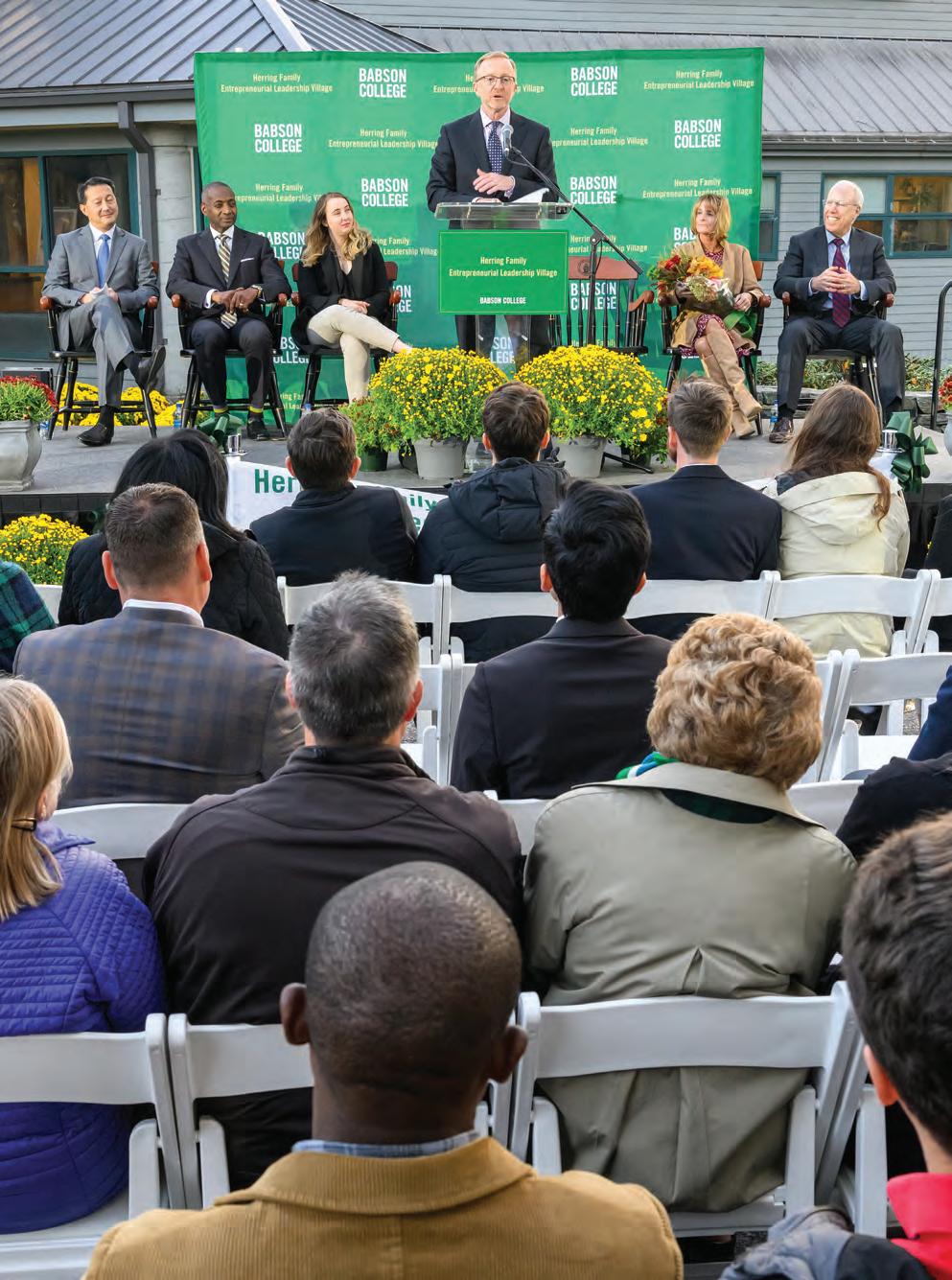
2 BABSON MAGAZINE / WINTER 2022–2023
PHOTO: JUSTIN KNIGHT
VILLAGE DRIVES STRATEGIC VISION
thanks to Bruce Herring ’87, P’19 and Family
Bruce Herring ’87, P’19 and Babson celebrated the College’s strategic vision at an October event to dedicate the Herring Family Entrepreneurial Leadership Village (ELV)—a sweeping, one-of-akind facility to bring students, faculty, staff, partners, and new stakeholders together, as a community, for unique living and learning experiences as well as educational experimentation.

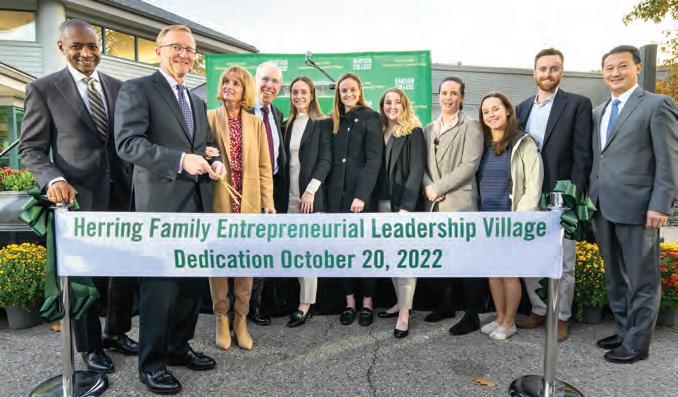
Construction of the new physical village, which will include classrooms, collaborative spaces, and a café, is expected to start in late spring 2023. The Babson Executive Conference Center will be located within the ELV. The project
is fully financed through the generosity of funders such as Herring, The Blank Foundation, and others.
For Herring, the real gift is seeing the College’s strategic plan expand its focus to entrepreneurial leadership so that every Babson student can benefit from the College’s trademark entrepreneurial teachings.
“The future, in my opinion, is teaching people to be creative, problemsolving, action-oriented leaders in their organizations and community,” Herring said. “That’s what Babson does, and my family and I couldn’t be happier to be a part of that big strategy.”
Read more about the
Family ELV: bab.sn/HerringELV PHOTOS: JUSTIN KNIGHT
Herring
WINTER 2022–2023 / BABSON MAGAZINE 3
CELEBRATIONS AND DEDICATIONS ACROSS CAMPUS
Len Green Recreation and Athletics Complex
As a successful entrepreneur and CPA, Len Green (ADE 2021) has spent his career finding and maintaining a competitive edge. And, as a longtime Babson professor, he has spent the past two decades instilling that spirit into his entrepreneurship students. To succeed, Green says, students need the physical and mental advantages that come from athletic activities. “I really believe that if you’re going to be an entrepreneur, athletics has got to be part of it in some way,” Green said.
Green’s love of sports has led to his
enduring financial support for Babson Athletics, culminating at a September celebration to rename the Len Green Recreation and Athletics Complex, the College’s multimillion-dollar, state-ofthe-art facility that opened in 2019.
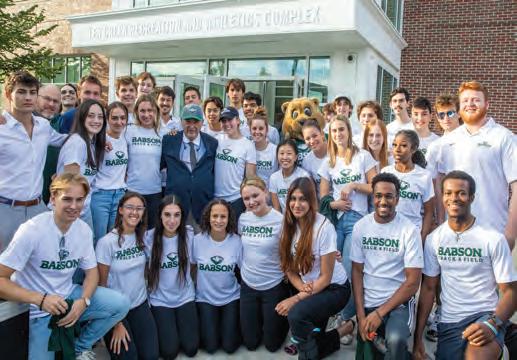
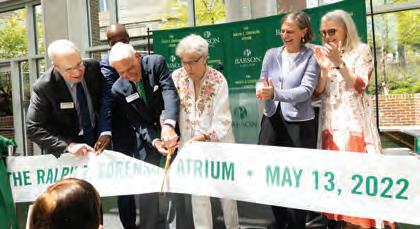
The ribbon-cutting ceremony at Lamere Plaza drew hundreds of community members. “I’m overwhelmed,” Green said. He thanked his wife of 63 years, Lois, and he praised Babson’s students: “It is a true honor to teach here. Nowhere are the students like you, nowhere.”
The Bertarelli Institute for Family Entrepreneurship
For Ernesto Bertarelli ’89, family entrepreneurship is less about the business itself and more about the family and its dynamics. His vision and his experience as a successful entrepreneur and philanthropist have inspired and driven Babson to advance the field of family entrepreneurship. Bertarelli returned to
Babson in October for a ribbon-cutting ceremony to dedicate the Bertarelli Institute for Family Entrepreneurship and to celebrate his and his family’s generous commitment to Babson. “Even though I haven’t stepped foot on campus for quite some time, my heart has never left,” Bertarelli said. “Babson really prepared me for what was to come.”
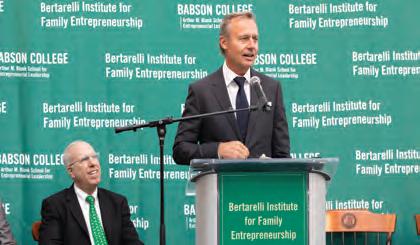
The atrium at Babson Commons was dedicated as the Ralph Z. and Charlotte R. Sorenson Atrium at a luncheon in May. President Emeritus Ralph Z. “Bud” Sorenson H’85 served as Babson’s seventh president from 1974 to 1981, a pivotal period in the College’s history that included the first significant capital campaign,
the construction of several major campus facilities, and a decision to become the premier school for entrepreneurship. “This means the world to (his wife) Charlotte and me and our entire family,” Sorenson said. “It’s been a privilege for us to be part of Babson’s history. And, we’re very proud to be part of its future.”
LEN
GREEN PHOTO: MICHAEL MANNING BERTARELLI
PHOTO: LAURIE SWOPE SORENSON
PHOTO: JAKE BELCHER
The
Ralph Z. and Charlotte R. Sorenson Atrium
4 BABSON MAGAZINE / WINTER 2022–2023 BABSON ANDBEYOND
Good Company, Good Game Course in Atlanta DELIVERS IMPACT AND INSPIRATION
Carissa Rubin ’25 decided to pursue a career in sports business when she was in the fifth grade and first saw the movie Draft Day. She told her mom that she wanted to be Jennifer Garner’s character when she grew up. “I love how confident and intelligent she was,” Rubin said, “and, most importantly, that she was working actively with sports every single day.”
So, when Rubin was among 18 Babson students selected for a unique new course on sports businesses in Atlanta this summer, she called her mom, screaming with excitement.

The unique new course—Good Company, Good Game: Law, Ethics and Leadership in Sports Businesses— was conceived and taught by Leslie Garbarino, assistant professor of practice in the Accounting & Law Division, with the support of The Arthur M. Blank School for Entrepreneurial Leadership at Babson College.
The course was based on the values that Arthur M. Blank ’63, H’98 describes in his 2020 book, Good Company, and included a weeklong trip to Atlanta to experience firsthand how his six core
values are embedded in his businesses.
The students shared their final video projects in the final class in September with Garbarino, their classmates, and some special guests, including Blank School CEO Donna Levin and Brett Jewkes, the EVP, chief brand and communications officer for the Blank Family of Businesses and AMB Sports & Entertainment, who flew from Atlanta
to Babson’s campus.
“It was the most incredible experience,” Rubin said. “This course not only shows me that that’s what I want to do as my career, but I can excel in it and I can get to that spot in my career. It’s just the most empowering thing, and I just can’t thank Professor Garbarino and Babson enough for making it happen.” — Eric Beato
Cisneros Family Receives BABSON-CAMUS AWARD
Venezuelan businessman Gustavo Cisneros ’68, H’19 and his family received the Babson-Camus Global Family Entrepreneurship Award in September at a Miami event that was as much about celebrating Cisneros’ commitment to the future as it was about the family’s successful history.
“Thank you to Babson and Camus for recognizing my family’s commitment to our values and driving impact, both in our businesses and through our
founding programs,” Cisneros said.
Those programs, established by him and his wife, Patricia Phelps, are part of Fundación Cisneros, a private nonprofit institution committed to improving education in Latin America while increasing international awareness of the region’s contributions in the global cultural arena.
The Cisneros family’s commitment to improving the world for future generations is a perfect example of why Cyril Camus ’92, P’26 and the Bertarelli Institute for Family Entrepreneurship created the Babson-Camus Global Family Entrepreneurship Award. “Gustavo
and his family have embodied the spirit of family entrepreneurship, passing down the legacy of business philanthropy from generation to generation,” said Camus, a fifth-generation leader of CAMUS Cognac, a Babson trustee, and chair of Babson’s Global Advisory Board.
“This year’s award is being presented to an entrepreneurial family that has developed a highly distinguished and impactful business that will create social and economic value for generations to come,” President Stephen Spinelli Jr. MBA’92, PhD said. “Through this award, we hope to inspire entrepreneurial families throughout the world.” — Hillary Chabot
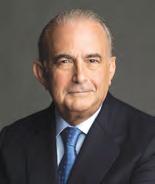 Babson students visit Mercedes-Benz Stadium in Atlanta as part of the Good Company, Good Game course.
Babson students visit Mercedes-Benz Stadium in Atlanta as part of the Good Company, Good Game course.
STADIUM PHOTO: MATTHEW GRIMES
WINTER 2022–2023 / BABSON MAGAZINE 5
Dedication of New Babson WIN Tulsa Draws INSPIRATION FROM HISTORIC ROOTS
A group of staff, faculty, and other community members said a tour of Babson’s new Women Innovating Now (WIN)®, located in the historic Greenwood District of Tulsa, Oklahoma, left them inspired, humbled, and motivated about the new partnership with community leaders.
Babson WIN Tulsa, a program dedicated to boosting women entrepreneurs and local economies, is located inside the Greenwood Women’s Business Center (WBC). The building is one of the last structures left standing after the 1921 Tulsa Race Massacre, the most destructive racial violence in U.S. history. Before the attack, the area was a thriving economic hub for the Black community that was often referred to as “Black Wall Street.”
The Greenwood WBC opened in the heart of the Greenwood District last year as part of an effort to continue the area’s entrepreneurial legacy. Babson
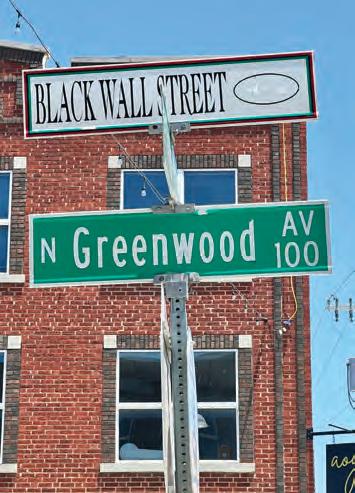
WIN Tulsa is opening in partnership with the WBC, Greenwood Chamber of Commerce, U.S. Black Chambers Inc., the U.S. Small Business Administration, and local Tulsa universities.
Shakenna Willams ’94, executive director of Babson’s Center for Women’s Entrepreneurial Leadership (CWEL), highlighted the College’s growth and commitment to boosting women entrepreneurs and local economies during the trip in June. She toured the new WIN location along with Babson’s visiting group that included CWEL board members and Gerald Watson ’76, the founding chair of the Babson Black Alumni Alliance.
“I am honored to be here for the opening of CWEL Tulsa, which is an extension of Babson’s entrepreneurial leadership programming designed specifically to meet the needs of women business owners here in Tulsa, Oklahoma, and the Southwest region,”
Williams said. “We hope to provide Tulsa with access to the resources that have helped more than 6,500 women nationwide grow their businesses and transform their communities for nearly two decades.”
— Hillary Chabot
Expanding Entrepreneurial Leadership on the EMERALD ISLE
A Babson-hosted gathering aimed at expanding relationships and entrepreneurial endeavors drew a hearty crowd of corporate and political attendees as President Stephen Spinelli Jr. MBA’92, PhD announced a new Babson accelerator program in Dublin, Ireland.
“The world is changing so rapidly that you’ve got to be entrepreneurial—it’s become a required competency,” Spinelli told a crowd that included U.S. Ambassador to Ireland Claire D. Cronin. “As the necessity to learn entrepreneurial problem solving has progressed, so has our relationship with Ireland. Now’s the time.”
The program, Babson’s Accelerator for Growth, Innovation and Entrepreneurial Leadership
(B-AGILE), brings inclusive learning to mid-level managers in companies, government agencies,
and nonprofits. B-AGILE, which will also be available in Europe, teaches managers and highperforming employees the tools to drive innovation and create entrepreneurial solutions, increasing the organization’s value in an ever-changing world.

Cronin, a Brockton, Massachusetts, native appointed by President Biden, lauded the program for emphasizing continued learning and diversity. “Babson College is united by a shared vision to create positive changes in the world and the goal of creating social and economic value everywhere,” Cronin said. “So, I’m pleased that such an incredible educational institution came to Ireland to build new relationships and continue this important work.”
— Hillary Chabot
DUBLIN PHOTO: PETER HOULIHAN/COALESCE
6 BABSON MAGAZINE / WINTER 2022–2023 BABSON ANDBEYOND
NEW FACULTY CLASS Brings Vast Knowledge Base to Babson
The 2022–2023 academic year marks an important milestone for Babson College. With 19 new faculty members, the College sees its largest hiring class in a single year. Their work stretches across eight of the 10 academic divisions and demonstrates the breadth of expertise— from philosophers to actuaries to marketing consultants to U.S. Coast Guard commanders—found in Babson’s classrooms.
This new cohort—including fulltime faculty members and visiting professors—brings the total to more than 200 faculty members teaching, mentoring, and guiding undergraduate and graduate students as they navigate Babson and the professional world. The new faculty’s vast careers, education, and interests will help shape the College
over the next decade and beyond.
Five of the new faculty members have joined the Math, Analytics, Science, and Technology (MAST) Division, which has expanded its department name beginning this academic year: Zefeng Bai, Sarah Foster, Vivian Leung, Nazanin Naderi, and Hongsheng Wu.
Other new faculty members include Cristina Alberti, Kimberly Silva, and Hannah Weiser (Accounting & Law); Alex Adamson and Samantha Wallace (Arts & Humanities); Stephen Brand (Entrepreneurship); Ahmed Ahmed (Finance); Jessica Burkland, Yamlaksira Getachew, Madeline King Kneeland, and Emily Rosado-Solomon (Management); Ellie Kyung (Marketing); and Emily Griffin and Daniel Rice (Operations & Information Management).
GEM REPORT: Gen Z Appetite for Entrepreneurship Grows
An unprecedented surge of young adults—fueled by aspirational causes such as climate control and social justice—plunged into the world of entrepreneurship this year despite ongoing economic uncertainty, according to Babson’s 2021/2022 U.S. Global Entrepreneurship Monitor report.
In a trend researchers say “hasn’t been seen in recent history,” 20% of those polled aged 18 to 24 have high entrepreneurial intentions. The same age group, which is largely Generation Z, also expressed high entrepreneurial intentions, meaning they’ve started to create a new business at a rate of 19%.
Researchers surveyed more than 2,000 American adults to provide a
comprehensive look at how the last year, including the ongoing impacts of the pandemic, impacted entrepreneurs and business owners. A whopping 68% of entrepreneurs and 54% of established business owners care more about the social and environmental impact of their business than profitability or growth.
“As the pandemic lingered, it brought an ongoing focus on world health and globalization,” said Jeff Shay ’87, MBA’91, professor and executive director for academic operations at Babson College’s The Arthur M. Blank School for Entrepreneurial Leadership. “In response, entrepreneurs recognized evolving opportunities addressing social, economic, and environmental concerns.”
Babson Wins First NIH Grant
Babson’s Kerry Murphy Healey Center for Health Innovation and Entrepreneurship received a grant from the National Institute on Drug Abuse, part of the National Institutes of Health (NIH), to create a program teaching entrepreneurship to scientists researching the overdose epidemic and substance use disorders. The grant, the first from NIH to Babson, is expected to provide up to $1.5 million over five years, while the curriculum created is meant to increase the chance of new startups created to address substance abuse disorders.
Women’s Golf Team for Fall 2023
Babson Athletics announced the addition of women’s golf for the 2023–2024 academic year, becoming the 23rd varsity program and first varsity addition since men’s and women’s track & field in 2001. Current part-time men’s golf head coach Jeff Page will be promoted to full-time status as the head men’s and women’s golf coach.
Five Join Athletics Hall of Fame
The Babson College Athletics Hall of Fame welcomed its five newest members at a ceremony during Back to Babson. The 18th induction class included Catie Funk ’13 (softball), Jason Kosow ’04 (baseball), Anita Martignetti Sassi ’08 (women’s lacrosse, soccer), Kevin Sampson ’94, MBA’03 (men’s soccer), and Nicole Wurdeman ’12 (women’s basketball).
Also in the News
• Patty Patria has been named Babson’s new chief information officer, providing strategic leadership for the planning and delivery of information technology and library services to support the College’s strategic plan.
• Professor of Film Julie Levinson, the chair of the Arts and Humanities Division and one of the associate deans of faculty, has been appointed the William R. Dill Governance Professor, an endowed chair professorship.
• Babson has been honored with a Council on International Educational Exchange (CIEE) Bridge Builders award for educating entrepreneurial and business leaders with a global mindset.
FOR MORE BABSON NEWS AND EVENTS: entrepreneurship.babson.edu
WINTER 2022–2023 / BABSON MAGAZINE 7
Taking Risks on the Page and the Stage
In her role as professor of English at Babson College, Mary Pinard encourages students to take creative risks and bring vulnerability and authenticity to their work, habits that will serve them well whatever their career path. Last summer, she saw her own creative risks pay off.
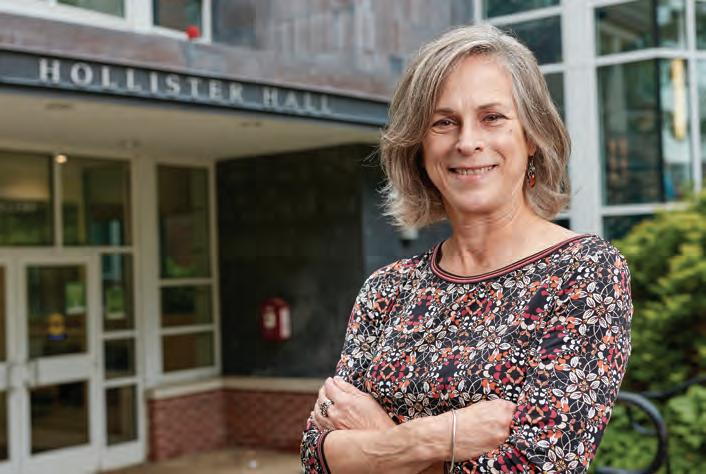
Pinard collaborated with Associate Professor Beth Wynstra, a theater scholar and director, in writing and producing a play, Heart/Roots: Wabaunsee County. Based on stories shared by residents of Wabaunsee County, Kansas, the production was performed on two sold-out nights in June.
Pinard got to know this cattleranching community in northeast Kansas several years ago, when she served as poet-in-residence at The Volland Store, a general store near the town of Alma built in the early 20th century. The refurbished building serves as an art gallery and cultural space, and the ruins of the 1917 family house on the property have been restored for outdoor theatrical productions. Pinard was invited to write the rst play to be performed there. Although she had never written a play, she agreed as long as she could collaborate with Wynstra.
The professors visited Alma in August 2021 and began collecting stories of residents, from high school students to people in their 80s who remembered the store’s original owners. “One individual shared the story of an injury his father sustained while rustling cattle, and the poignancy of
realizing his father was a hero but also vulnerable,” Pinard says. She used the stories to write the monologues, scenes, and sonnets that made up the play. Pinard received additional help from Professor Sandra Graham, an ethnomusicologist, who scored one of the sonnets so it could be sung in the play, and Associate Professor Joseph Ricciardi, an economist who translated another sonnet into Spanish.
Pinard and Wynstra returned to Alma in March for in-person auditions and cast all local residents. Wynstra held weekly rehearsals online, and they both returned to Kansas one week before opening night to rehearse in person. Pinard credits Wynstra, as director, for bringing everything together, including the local cast and crew. “Beth made
it possible for those actors to take risks and come together in the most wonderful way,” Pinard says. “They brought a kind of texture to the play that made it very real and authentic.”
In September, Pinard’s latest collection of poems, Ghost Heart, was published by Ex Ophidia Press. Many of the poems refer to the Kansas prairie and were written while she was in residence at The Volland Store.
“I ask my students to take a lot of risks as makers, and I would never ask them to do something that I hadn’t already tried,” Pinard says. “I want to share stories of my own vulnerability and the ways that you doubt when you’re making something. I hope it’s encouraging to them. I know how scary it is to face the blank page.”
—
OFFICEHOURS
MICHAEL QUIET
Erin O’Donnell
PHOTO:
With her colleagues’ support, Mary Pinard writes a play, which is set and produced in rural Kansas
PLEASE VISIT OUR DIGITAL BOOKSHELF BABSON.EDU/BOOKSHELF Featuring Publications by Babson Faculty
Mary Pinard is a professor of English at Babson.
8 BABSON MAGAZINE / WINTER 2022–2023
I ask my students to take a lot of risks as makers, and I would never ask them to do something that I hadn’t already tried.”
Small Talk with DENICIA RATLEY
During seminary, Denicia Ratley resisted taking a business ethics class, unconvinced it connected with her faith and spirituality. Ironically, she loved the course. So, after completing two master’s degrees at Gordon-Conwell Theological Seminary, she joined Babson College in 2016, providing religious service for students at a top business school. As the director of Religious & Spiritual Life, Ratley oversees a team of four chaplains, coordinates five student faith groups, and works directly with students of all faiths. “I really do feel like coming to Babson was divine,” she says.
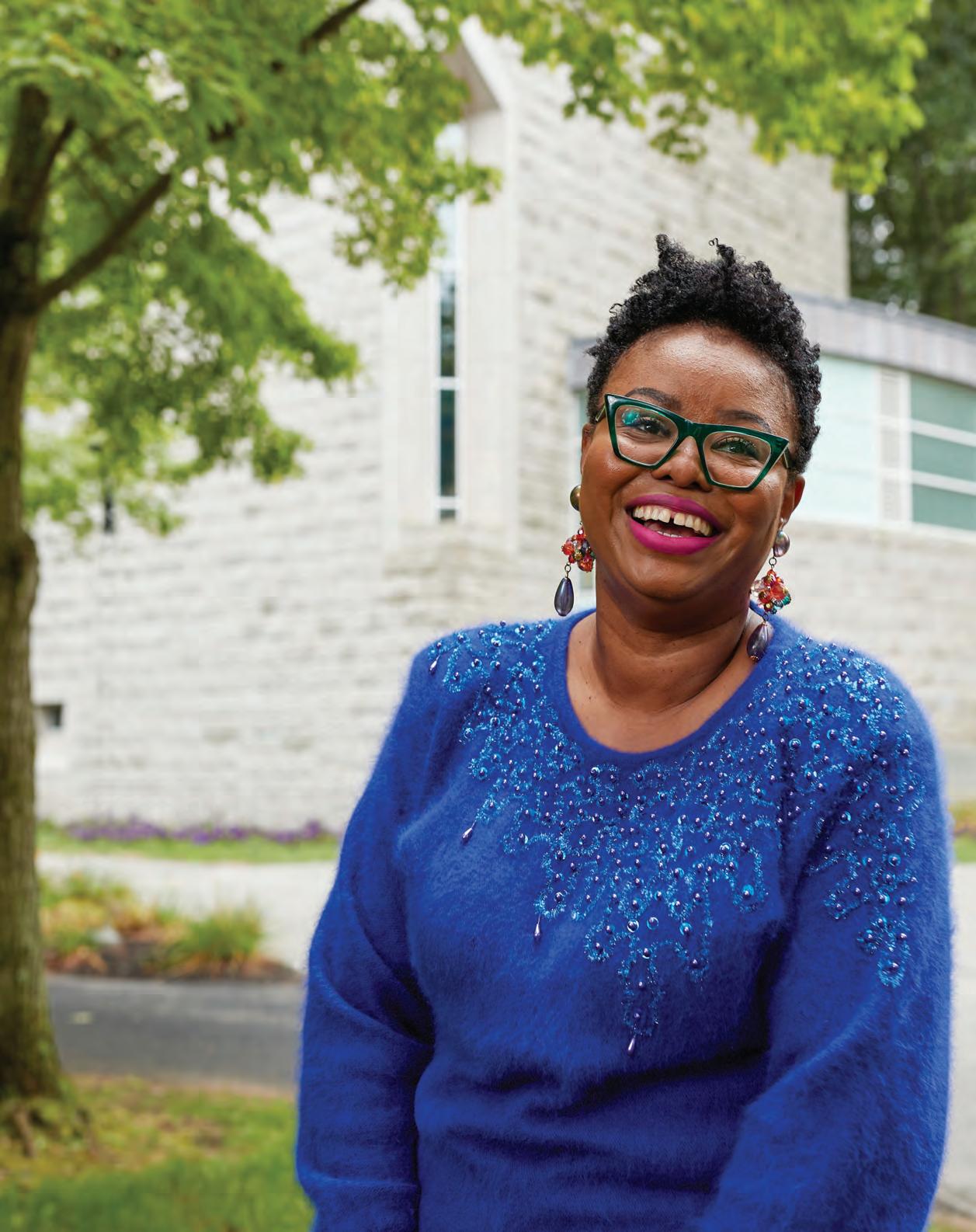




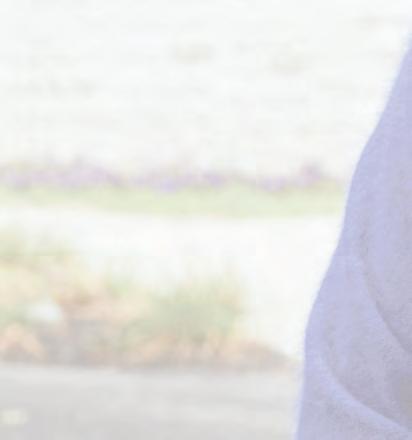
What is the scope of your role and how does Religious & Spiritual Life support students?

“I’m always focusing on what students need at that moment, but trying to also anticipate what they’re going to need in the future. That includes planning programming, creating spaces where there’s healing, and healthy ways to experience faith. That also includes partnering with dining services to accommodate students’ dietary needs, or connecting with Student Advising and faculty to accommodate student travel for religious holidays. I have to be ready for the unexpected and life interruptions.”
What is the reaction of Babson students to the services you provide?
“Students are very thankful, and they’re really sincere. One particular student told me, ‘I only chose Babson because when I visited here, and I met you all, I really felt like I could sustain my faith here. I felt like my faith would grow here.’ We don’t try to impose our beliefs on students, but we just invite them and we journey with them.”
How does spiritual care and religious tolerance support the College’s objective to advance diversity, equity, and inclusion (DE&I)?
“The majority of the work we do supports DE&I because faith and religious practices are one of the most in uential identities. It in uences what people think, how they believe, how they practice, how they behave, what they choose to do, who they choose to be around, who they choose to include or exclude. So, if we can catch them in those formative years, where they’re learning about themselves, we also can plant seeds of inclusion, which hopefully and prayerfully will lead to religious tolerance.”
— Eric Beato
PHOTO: MICHAEL QUIET
PEOPLEOFBABSON WINTER 2022–2023 / BABSON MAGAZINE 9
READ OUR COMPLETE Q&A WITH DENICIA RATLEY: magazine.babson.edu
By John Crawford


Franchising is an effective, enduring, and lucrative way of doing business. As the industry recovers from the disruption of the pandemic, it looks toward the future, one marked by new business trends, new leaders, and new educational opportunities courtesy of Babson’s Tariq Farid Franchise Institute.







 PHOTO: KEVIN LILES
PHOTO: KEVIN LILES
10 BABSON MAGAZINE / WINTER 2022–2023
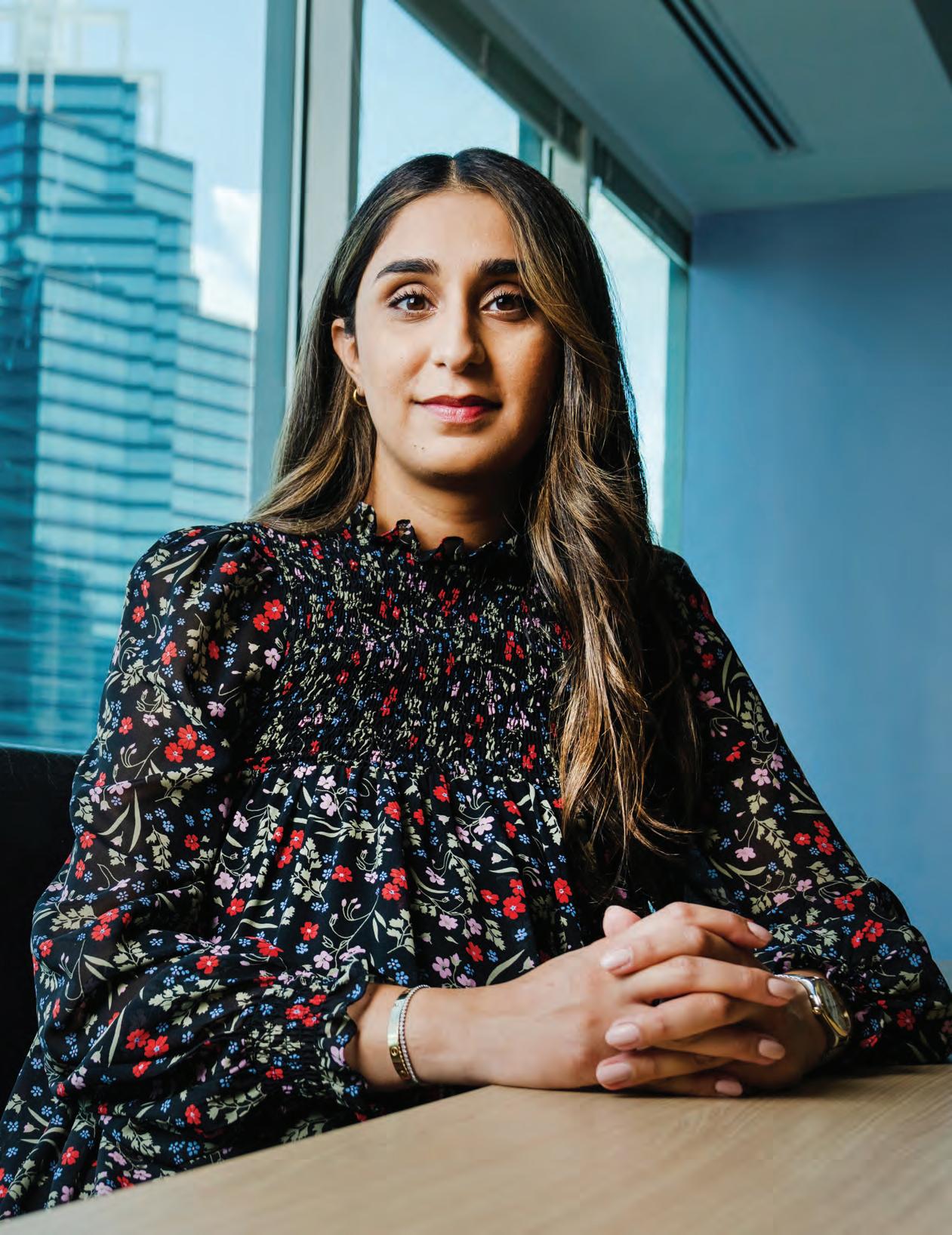
WINTER 2022–2023 / BABSON MAGAZINE 11
Somia Farid Silber ’15 serves as president of Edible Brands, as well as a trustee at Babson.
$674 billion.
That’s how much money franchising generates every year in the United States. As a way of doing business, it is effective, enduring, and lucrative, and evidence of its success can be seen far and wide. Take a drive just about anywhere, and myriad franchises that are household names dot the landscape.
“We have brands that have been around a long, long time, from the beginning of franchising in this country,” says Ab Igram MBA’96, the executive director of the Tariq Farid Franchise Institute at Babson College. “There is resiliency built into the franchising model for those who do it the right way. It has withstood the test of time.”
The pandemic provided a daunting test of that resiliency. As the world locked down, the very idea of having a physical location for a franchise began to look unnecessary. Customers became so wary of going indoors that the use of drive-throughs surged, and so-called ghost kitchens, eateries that exist for the sole purpose of fulfilling online orders, began popping up. A large number of franchise locations, across a wide swath of sectors, were forced to shut for long stretches or close altogether. “We didn’t know what the future held in the midst of it,” Igram says.
In response, franchisees and franchisors embraced technology and got creative. Eateries doubled down on delivery, and health and wellness franchises offered their classes online or outside. Franchise owners also leaned on each other for support and advice, and franchisors provided flexibility, allowing franchisees to delay scheduled (and costly) store improvements.
“You had to be entrepreneurial and adapt,” Igram says. “There was a lot of collaboration and communication. They worked together to weather the storm.
The franchise model proved to be more resilient than independently owned businesses with less scale and support.”
Now that the storm is passing, those in franchising look to the future, one marked by new business trends and a new generation of franchise owners. It is a future in which Babson, through the institute that Igram leads, plans to play a major role.

A Need for Education
The Tariq Farid Franchise Institute was launched last year thanks to the generosity of Tariq Farid P’15, the CEO and founder of Edible Brands, and his family. Farid takes an active role in the institute, along with his daughter, Somia Farid Silber ’15, who serves as president of Edible Brands, as well as a trustee at Babson.
Focusing on education, research, and experiential learning, the institute resides within Babson’s Arthur M. Blank School for Entrepreneurial Leadership and provides an academic focus on franchising that is typically lacking in higher education. “The whole industry missed out on education,” Farid says. “I started out in a tiny little flower shop with the first Edible store next door when no one taught franchising in school. We’re hoping to change that.”
The entrepreneurial leadership that Babson can impart to the industry is needed. “For any franchisee to be successful, they have to have that entrepreneurial mindset,” Silber says. “It is a key quality we look for in our franchisees. Being adaptable allows them to be successful no matter what new challenges arise in the market and in their business.”
The work of the institute comes as franchising finds its footing after the tumult of the pandemic. Disruptions in the industry have simmered down. “Post-pandemic, it has given everyone the chance to hit the reset button,” Farid
12 BABSON MAGAZINE / WINTER 2022–2023
— Ab Igram MBA’96
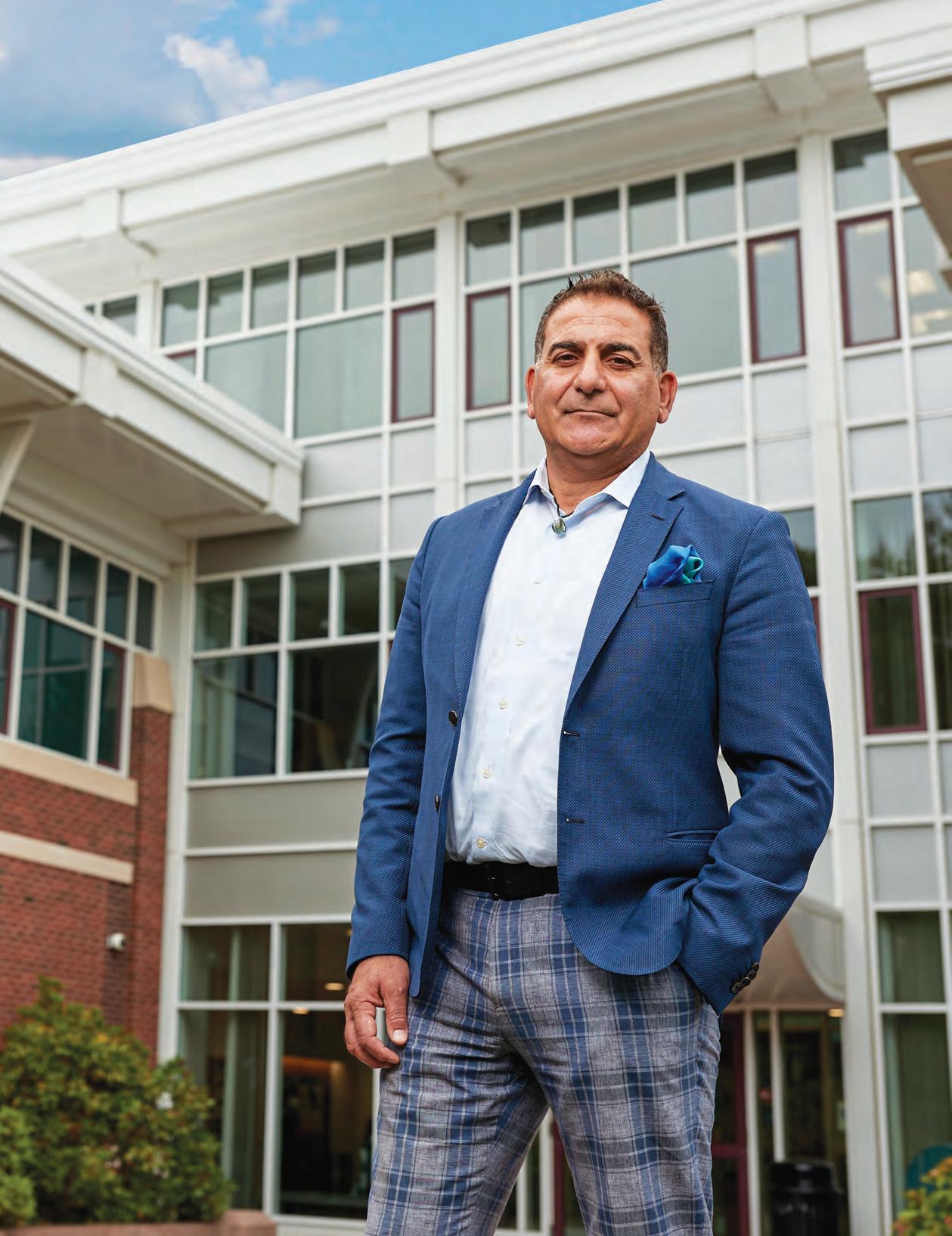


 PHOTO: MICHAEL QUIET
Ab Igram MBA’96 is the executive director of the Tariq Farid Franchise Institute at Babson College.
PHOTO: MICHAEL QUIET
Ab Igram MBA’96 is the executive director of the Tariq Farid Franchise Institute at Babson College.
There is resiliency built into the franchising model for those who do it the right way. It has withstood the test of time.
WINTER 2022–2023 / BABSON MAGAZINE 13
Franchising is the best of entrepreneurship. You bring your energy, and we’ll give you something to sell. We build millionaires. We build entrepreneurs. That’s what we do. We are an incubator of entrepreneurs.
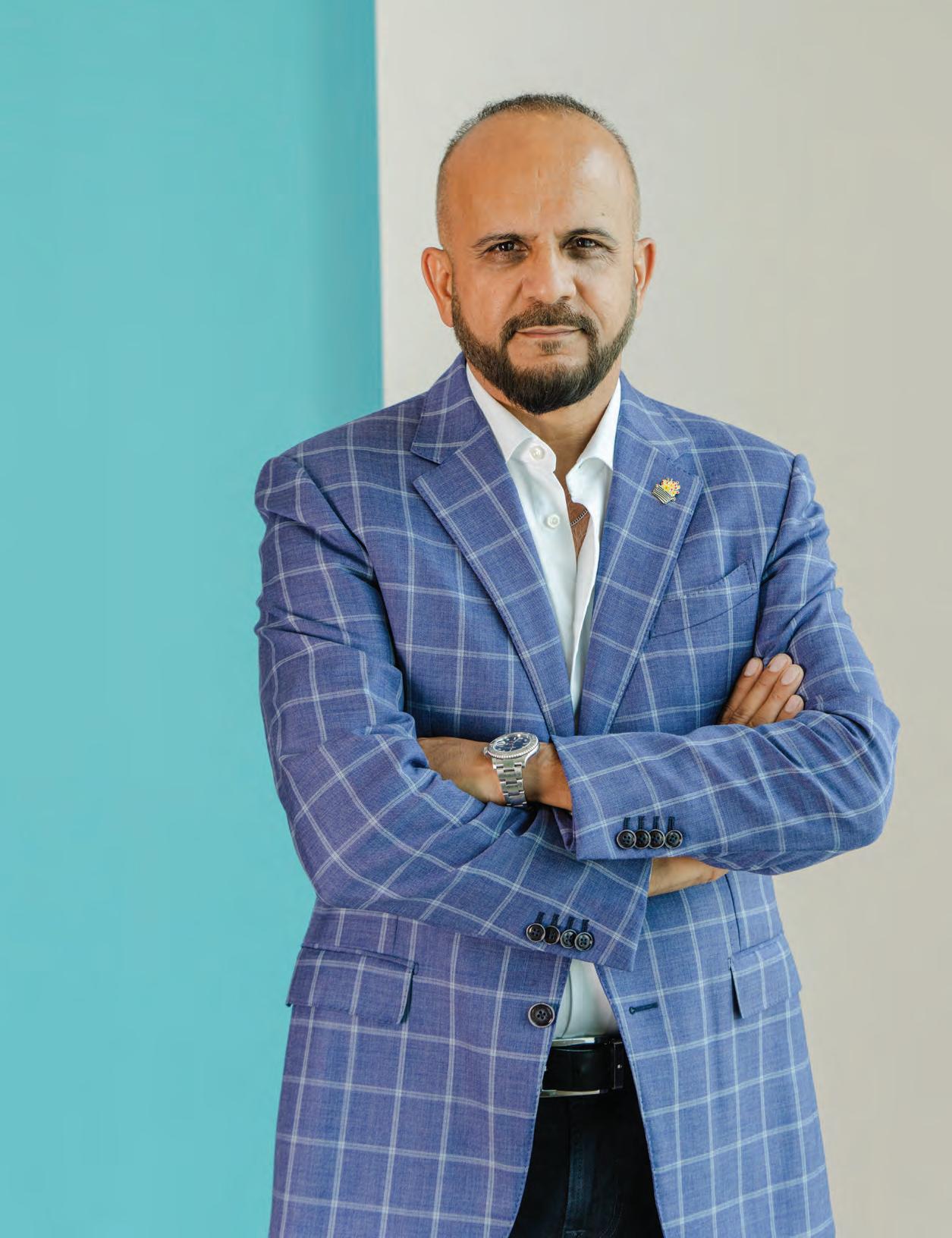
— Tariq Farid P’15
 Tariq Farid P’15, CEO and founder of Edible Brands and father of Somia Farid Silber ’15 (opposite page)
Tariq Farid P’15, CEO and founder of Edible Brands and father of Somia Farid Silber ’15 (opposite page)
14 BABSON MAGAZINE / WINTER 2022–2023
PHOTO: KEVIN LILES
says. Online ordering and delivery were critical during the height of COVID-19, for instance, but now customers are flocking back to physical locations, particularly in regard to food. “That physical food location isn’t going anywhere,” Farid says. “Brands are about experience. You need a physical location to have experience.”
Not that everything has returned to the status quo. Changes are afoot, and a new generation of leaders is increasingly remaking how business is done.
A Younger Generation
Edible Arrangements has more than 1,000 locations, and from their prominent vantage point in the industry, Farid and Silber have noticed a variety of trends shaping franchising’s future.
A big one is youth. The owners of franchises are becoming younger. “We are seeing a lot of growth with the millennial age group,” Silber says. “They are data driven. They are interested in using new technology that will help them find operational efficiencies and new revenue opportunities. It is a refreshing time.”
One prime example of this youth movement is Silber herself, who started working full time at Edible a year or so after graduation. “I was in a product manager role working with a team to create a new set of apps,” she says.
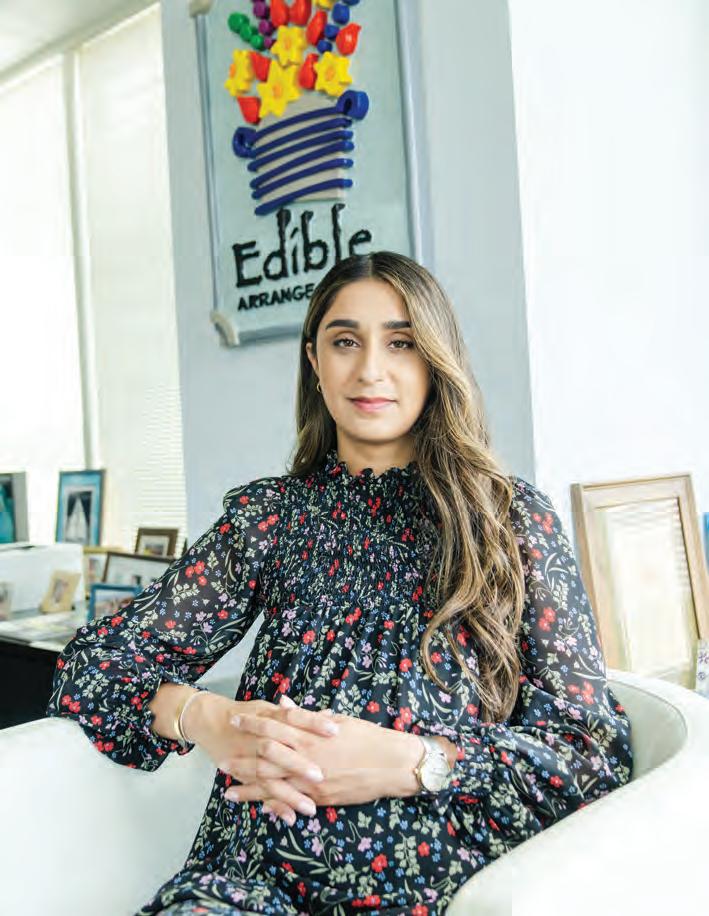
Those apps were used by franchisees and store employees to improve backof-house processes such as employee training and ensuring consistency in product quality. “Technology is the backbone of our business,” Silber says. “It was essential that I started out with this team to learn the inner workings of our processes and how to create franchising-specific tools and applications.”

With their interest in technology, younger franchisees are able to constantly reach out to customers. It’s a
long way from the old days of coupons and mailing lists. “I like to think back to the ’90s. I would like to think we were very engaged with the customer,” Farid says. “Now you have a generation that is connected to every customer in real time. And, they are good at it. The engagement is so much better.”
Work-life balance and especially sustainability are other concerns of younger franchisees. “There is a strong desire to leave a greater impact and do something that makes a difference,” Silber says. “That is ingrained with this next generation of franchisees.”
Youth also is driving a trend for franchises centered on health
KEVIN
PHOTO:
LILES
Although we are a national brand, we are continuing to evolve our stores to be seen as local businesses that are integrated into their communities.
WINTER 2022–2023 / BABSON MAGAZINE 15
— Somia Farid Silber ’15
and wellness, something that was nonexistent 15 or even 10 years ago.
“The next generation of consumers— millennials, Gen Z—are focusing on their health and well-being at an earlier age,” Silber says. “Healthy foods. Healthy lifestyle. They want to take preventative action.”
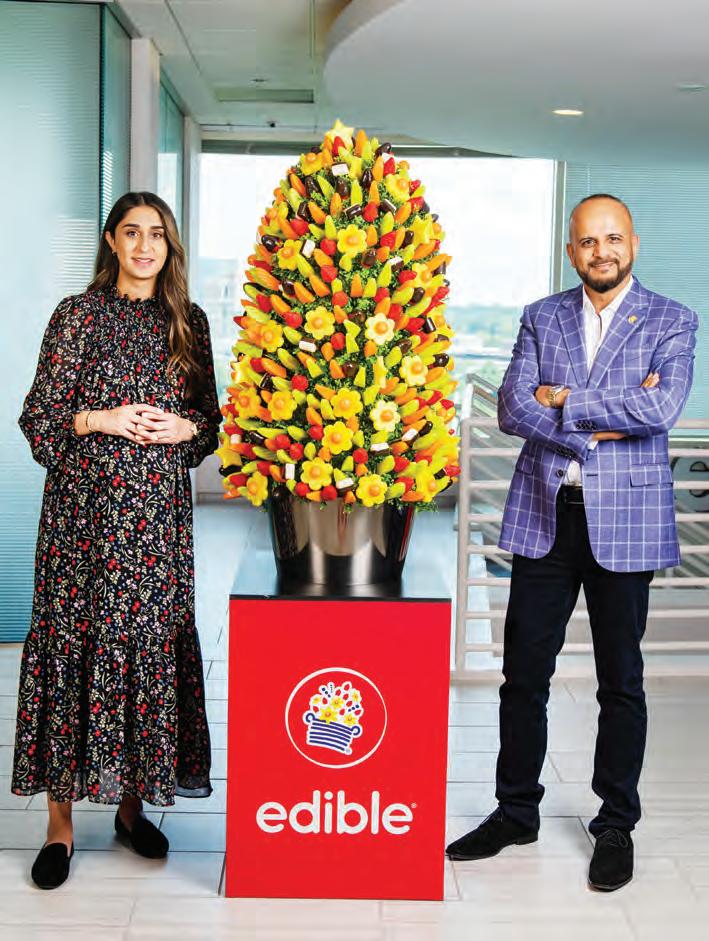
Something else that customers want is personalization. While they may have returned to physical locations, they aren’t settling for sterile, cookie-cutter experiences. They increasingly expect businesses to reflect their towns and neighborhoods. “There is more focus on shopping local and shopping in your neighborhood,”
Silber says. “Although we are a national brand, we are continuing to evolve our stores to be seen as local businesses that are integrated into their communities.”
The Missing Piece
As the franchising industry looks to the future, Igram believes that Babson and the Tariq Farid Franchise Institute are well-positioned to play a prominent role. “Babson has the perfect platform with all we teach in business education and entrepreneurship,” he says. “The opportunity is there.”
Though the institute was launched only last year, it already has awarded research grants for professors, started a student scholarship program, created experiential learning opportunities with companies, and built upon existing franchising content in a graduate class to make it a popular course on the subject. The institute also is weaving franchising expertise into other existing courses and forming a global advisory council of Babson alumni and industry experts who are involved in franchising.
Igram says the institute’s goal is to help students in all facets of the franchising industry, whether they are trying to launch and scale a new venture, operate one—or a slew of— franchise locations, or work in a variety of disciplines, from marketing to finance to supply chain management, within franchise brands. “Our hope is to increase awareness, increase education, and create new opportunities and pathways in the industry,” he says.
Igram believes that Babson’s
 PHOTO: KEVIN LILES
PHOTO: KEVIN LILES
16 BABSON MAGAZINE / WINTER 2022–2023
Somia Farid Silber ’15 (left) and Tariq Farid P’15, pictured at the Edible Brands headquarters in Atlanta, are lending their experiences and expertise to the Tariq Farid Franchise Institute at Babson College.
Collaborative

franchising students are entering an industry full of possibility. Consider the significant amount of investment franchising is attracting, not just with franchisors but also with franchisees who own multiple locations. A few large multi-unit franchise operators have even gone public. “If you had asked me 15 years ago if I thought that would be the case, I wouldn’t have been sure,” Igram says.
Not only have investors taken companies public, but they also are doing the opposite: taking public companies private to create large multi-brand operating companies and platforms. “You now have private equity funds acquiring and taking companies private and adding brands to create synergies and scale,” he says.
Reflecting on his past experience as a lender to both franchisees and private equity funds acquiring franchisors and franchisees, Igram says, “I have seen firsthand the increased demand and interest in the sector, which bodes well for the future.”
Igram also is inspired by the effect that franchises can have on a community, whether by creating jobs or by addressing sustainability and societal concerns through a socially responsible brand that’s passionate about such issues. “Franchising is a means to scale business and create economic and social value,” Igram says. “You can use franchising to make more of an impact in a community. That can be really, really powerful.”
Franchising is a potent means
to grow wealth, and that’s what excites Farid. Unlike a corporate-run chain enterprise, such as Starbucks, companies that franchise give others the chance to share in their success. Own a proven franchise, run it right, and one will do well.
“It’s a great model. Franchising is the best of entrepreneurship,” Farid says. “You bring your energy, and we’ll give you something to sell. We build millionaires. We build entrepreneurs. That’s what we do. We are an incubator of entrepreneurs.”
Babson’s institute will better prepare others to take part in the industry. “I like to think what Babson is doing is the final piece in the franchising ecosystem,” he says. “The last missing piece is this institute.”

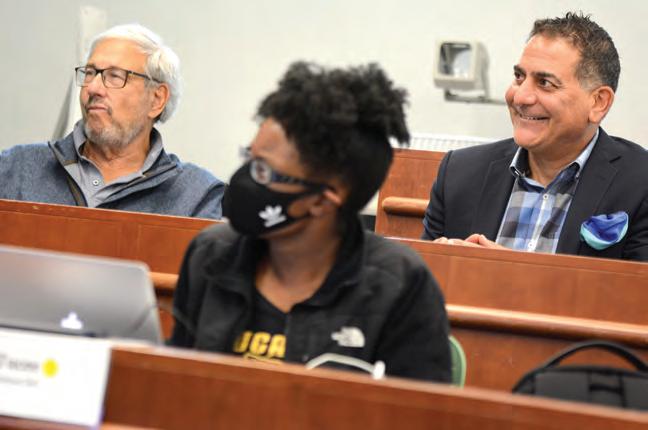
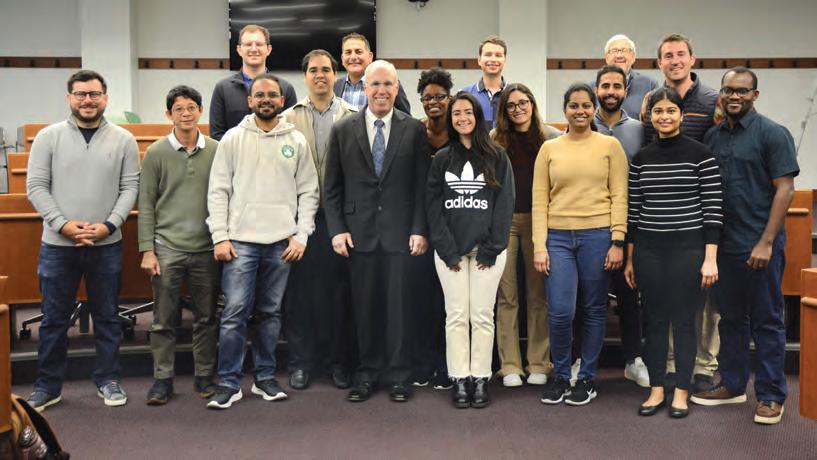
PHOTOS: BRYAN LIPINER
Left photo: A Babson graduate class on franchising recently welcomed President Stephen Spinelli Jr. MBA’92, PhD (bottom left photo) to share his expertise. Bottom right photo: The course—Franchising, Licensing & Distributorship
WINTER 2022–2023 / BABSON MAGAZINE 17
Business Models—is co-taught by Associate Professor of Practice Leslie Charm (left) and Ab Igram MBA’96 (right).
THE




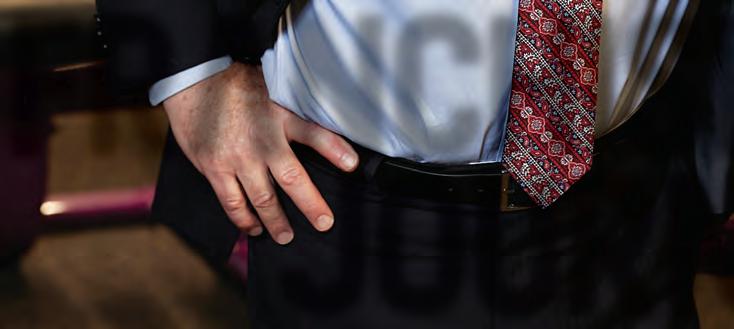
Franchising Journey
OF PRESIDENT SPINELLI
By Eric Beato
Babson President Stephen Spinelli Jr. MBA’92, PhD— who co-founded Jiffy Lube International and co-wrote the book Franchising: Pathway to Wealth Creation now is the chairman of the board at Planet Fitness.
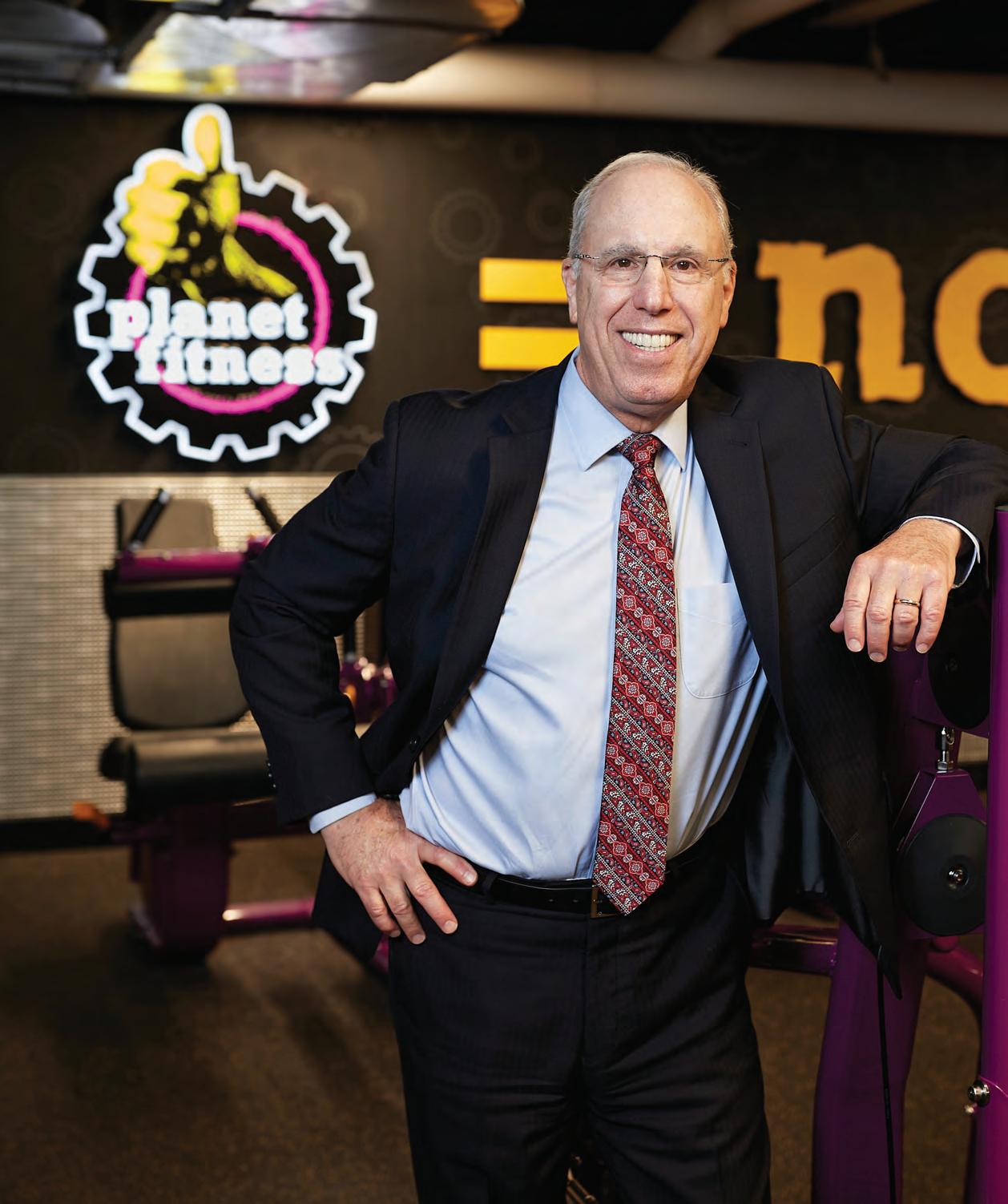 PHOTO: MICHAEL QUIET
PHOTO: MICHAEL QUIET
18 BABSON MAGAZINE / WINTER 2022–2023
The franchising journey of Stephen Spinelli Jr. MBA’92, PhD begins in a nursing home in Clinton, Iowa, with an opportunistic phone call.
It’s 1978, and the future Babson College president is the administrator at Clinton Retirement Village, which was owned by his former football coach at Western Maryland (now McDaniel) College. James Hindman, a successful entrepreneur who had built his fortune in elder care before becoming a football coach, called Spinelli with a proposal to leave Iowa and the nursing home.
Hindman and ve other former players were searching for a high-potential, big-money venture, and they wanted Spinelli on their new team. “We were getting together to do something big,” Spinelli says.
The coach and his protégés soon discovered a hidden gem in Utah—a tiny chain of momand-pop stores for quick-service automotive oil change called Jiffy Lube. With that, Spinelli set himself on the path to becoming not only a successful entrepreneur, but also an innovative leader who continues to passionately advance the eld of franchising in business and higher education four decades later.
Accelerating Innovation
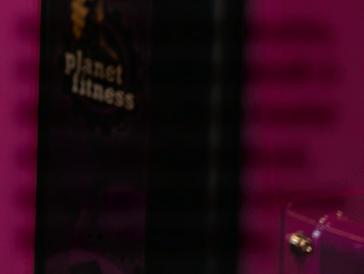
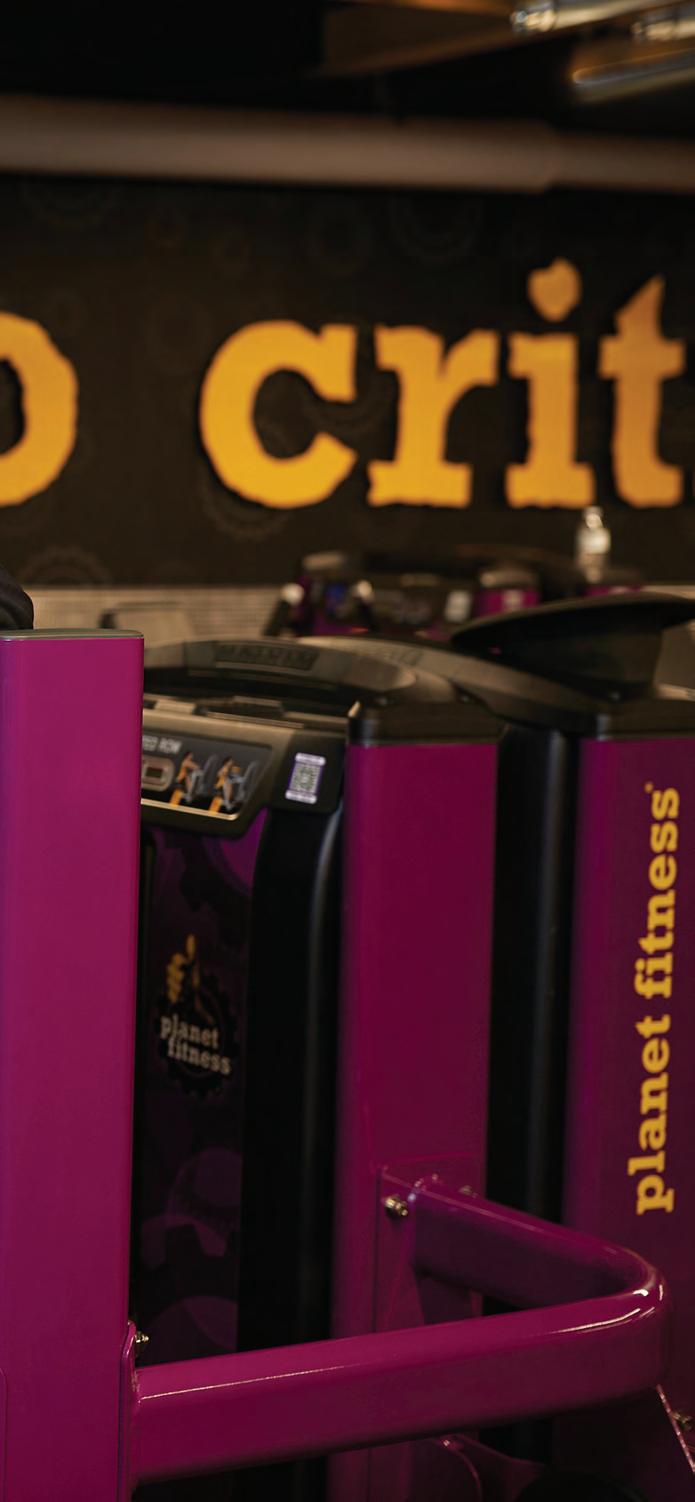
After accepting Hindman’s invitation, Spinelli joined his new partners in a Utah hotel room, where they dashed together an unsophisticated business plan to purchase the edgling chain. “Mostly with the coach’s money, but everybody put in some money,” he says. “I borrowed money. Everybody was a shareholder of that team.”
Spinelli and his new wife, Carol, moved to Ogden, Utah, where he began to develop Jiffy Lube into the iconic, ubiquitous brand we all know. “It was a big adventure. I was having fun, and I learned the business,” says Spinelli, who would observe every nuance of how it worked and dictate his ndings into a handheld recorder. “I wrote the operations manual that detailed exactly how a Jiffy Lube should look and function. I would draw diagrams, and my wife typed it for me.”
WINTER 2022–2023 / BABSON MAGAZINE 19
For more than four decades, President Stephen Spinelli Jr. MBA’92, PhD, the co-founder of Jiffy Lube International, has helped build and advance the field of franchising.
They rebranded it Jiffy Lube International Inc., with the objective to grow and grow fast. They determined the potential market for quick-lube service—how many cars in the United States (120 million), how often people change their oil (2.8 times a year)—and targeted opening 2,000 stores, each requiring an investment of more than $1 million. “So, we need $3 billion. Anybody got $3 billion?” Spinelli says. “We knew we had to nd resources. How do you match the resources to the ambition? We have to franchise.”
They began selling territories and creating multiple layers of franchising. “We developed a pretty sophisticated franchise plan,” Spinelli says, describing it as the ability to marry the opportunity with the urgency of the market and the capital required to exploit it. “That creates an ability to have a brand, and a brand that you can scale.”
The Jiffy Lube brand was built on a simple but revolutionary promise—10 minutes, 14 points of service, no appointment necessary. “We had to live to that; 10 minutes and 3 seconds was a failure,” he says. Scaling that brand also created ef ciencies through the supply chain—and negotiating leverage. In the early days, Spinelli went to Pennzoil, its oil supplier, with a tough offer to invest or lose a major customer. So, Pennzoil wrote a big check and helped fuel Jiffy Lube’s growth.
The collaboration among franchisees also spurred innovation. The precise placement of the building to maximize traf c ow, the exact height of the platform to increase leverage on a wrench, anything to create ef ciency. As the franchisor, Spinelli and his partners could help accelerate those innovations across the country. “You could feel an explosion of excellence happening in the franchise system,” he says.
From Franchisor to Franchisee
As Jiffy Lube grew and he saw the power and potential of franchises, Spinelli made two critical decisions that changed the path of his journey.
First, he decided to transition from franchisor to franchisee. “That’s where the money is made,” he says. Second, he decided he needed more education. So, he moved back near his hometown of Spring eld, Massachusetts, and began pursuing his MBA at Babson College part time while becoming the largest owner of Jiffy Lube franchises.
“Some people, especially back then, thought franchising was not entrepreneurial, but that’s crazy,” he says. “I needed to sort through
these instincts and experiences in a real curriculum, a real pattern of thinking. I worked very hard to learn the entrepreneurial process.” He found mentors in the likes of pioneering entrepreneurship professors William Bygrave and Jeffry Timmons. “They just opened my eyes.”
At the same time, Jiffy Lube was transitioning, too, and was acquired by Pennzoil in 1991. So, as its largest franchisee with burgeoning aspirations and a lot of leverage, Spinelli returned to Pennzoil with another tough offer: Buy me out. So, Pennzoil wrote another check and purchased all of his Jiffy Lube franchises.
“I hadn’t even nished my MBA,” he says, “and I decided that I wanted to be in academia.”
Educator and Expert
After earning his MBA in 1992, Spinelli stayed at Babson as an entrepreneurship professor, chair of the Entrepreneurship Division, vice provost, and director of The Arthur M. Blank Center for Entrepreneurship.
He taught a course on franchising, wrote his PhD dissertation on franchising (at Imperial College London), and co-wrote the book Franchising: Pathway to Wealth Creation with Robert M. Rosenberg, the longtime CEO of Dunkin’ Donuts. A full- edged franchising expert, Spinelli resisted countless opportunities to return to franchising as an investor or consultant or board member—until another opportunistic phone call.
It’s 2011, and Spinelli now is the president of Philadelphia University. Craig R. Benson ’77, H’03, a longtime friend and former governor of New Hampshire, needed advice at Planet Fitness, where he owned several franchises. Spinelli was intrigued and offered his expertise. A year later,
“It was a big adventure. I was having fun, and I learned the business. I wrote the operations manual that detailed exactly how a Jiffy Lube should look and function.”
20 BABSON MAGAZINE / WINTER 2022–2023
— President Stephen Spinelli Jr. MBA’92, PhD
Spinelli was invited to join the Planet Fitness board of directors, and he currently serves as its chairman—an advantageous opportunity for a college president to deal with real-world business issues.
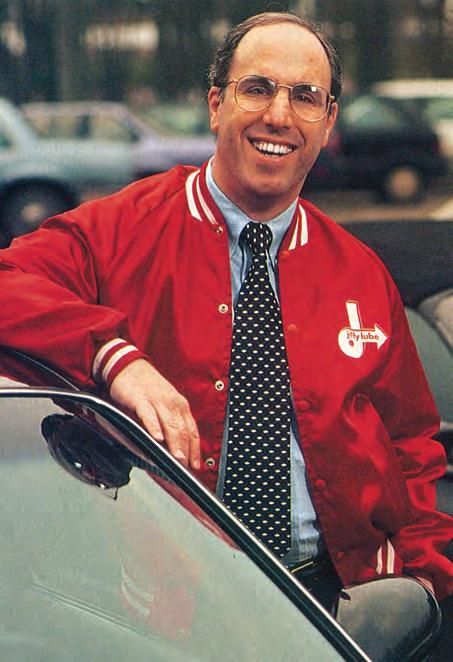
“I’ve got to be in the marketplace bumping into problems,” Spinelli says. “It toughens you up, it smartens you up, it puts you in networks, and it makes you a better manager and strategist.”
Franchising Legacy Spinelli, of course, is bullish on the future of franchising. “I see it burgeoning in a lot of ways,” he says. “It’s a fascinating, exible entrepreneurial tool, but you better be entrepreneurial, you better be innovative, you better have relational skills.”

The franchise entrepreneurs of the future will need more specialized education to keep pace. An entrepreneurial school such as Babson is uniquely positioned to deliver, which brings Spinelli’s franchising journey full circle. He returned to Babson as
president in 2019, and last year, the College opened the Tariq Farid Franchise Institute (see Page 10).
“Franchising will be a normal part of a business school curriculum,” he says. “Every college will have a course in franchising, and many will have centers dedicated to franchising. I absolutely believe it.”



Spinelli also cites the large number of Babson alumni who are in franchising, either as a franchisor or franchisee, or in the franchising ecosystem. That makes the new institute a natural t for Babson—and for Spinelli’s franchising legacy.
Instead of scaling Jiffy Lube franchises, he envisions the Tariq Farid Franchise Institute accelerating its research and expanding the concepts that drive franchising education across
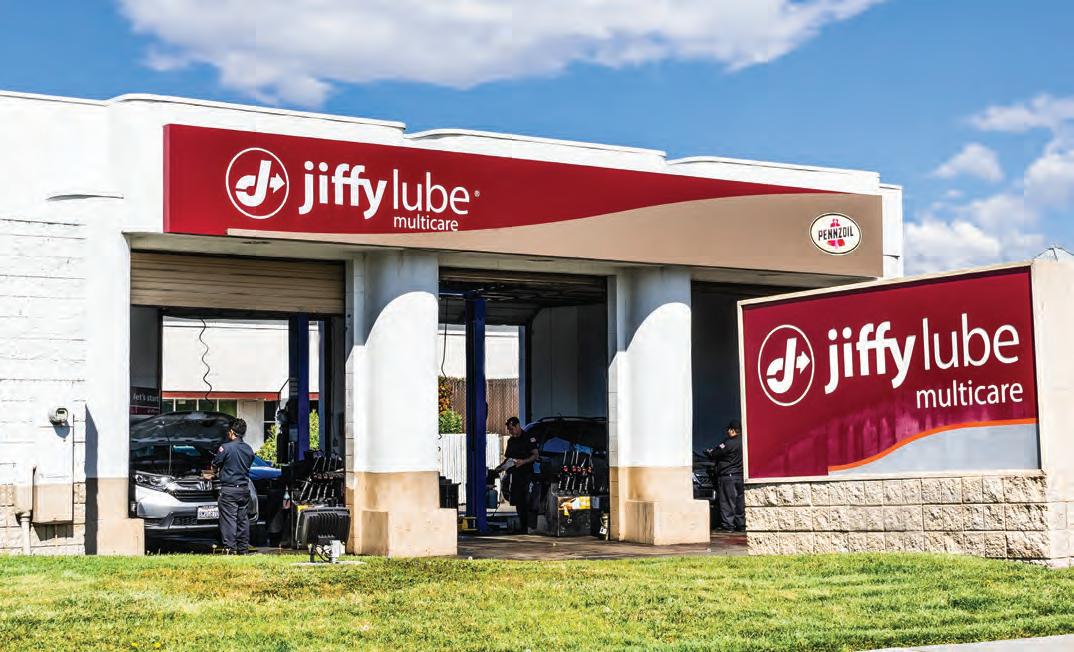
business schools.
“It makes complete sense,” he says. “It’s about entrepreneurship. It’s about growth. It’s about high-potential ventures. It’s about empowering people. It is Babson.”
SPINELLI PHOTO: STEPHEN DAHLGREN WINTER 2022–2023 / BABSON MAGAZINE 21
Stephen Spinelli Jr. MBA’92, PhD at a Jiffy Lube franchise in 1994.
Alumni Faces of Franchising












 By Kara Baskin
By Kara Baskin
From Big Macs in Bahrain to sandwich shops in Las Vegas to barre classes in Western Massachusetts, Babson alumni are thriving in the world of franchising. Here is a look at just a few alumni who have found success and happiness in franchising.
 PHOTO: MARK MANNE
PHOTO: MARK MANNE
22 BABSON MAGAZINE / WINTER 2022–2023
Elizabeth Roberts ’06 in her first Pure Barre location in Northampton, Massachusetts
Stretching Yourself
Like many people, Elizabeth Roberts ’06 reassessed her priorities during the Great Recession. She had enjoyed a successful career with FTI Consulting, advising companies on performance improvement, and with a boutique wealth management rm. After starting a family, she turned the analysis inward: It was time for a change.
Roberts didn’t expect to nd it during an exercise date with her husband, Frank Roberts ’04, though. The couple dropped their two kids with grandparents to check out Pure Barre, a popular low-impact, high-intensity workout set to music. A lifelong athlete, she gured the class would be an easy way to decompress and check out a new tness concept. But, the isometric, 50-minute ballet-style session left her shaking and sweating. She was hooked—and sure of her next move.
“From my phone, on the way home,
I submitted an application to become a franchisee,” she says.
After a successful interview and a detailed three- to ve-year business plan—“Babson’s entrepreneurship classes really prepared me for that,” she says—Roberts was greenlit to open a location in Northampton, Massachusetts, close to her Easthampton home.
“I did a classic Babson move. I bootstrapped it. I used all of my savings and a zero-percent credit card to open my rst location,” she says.
The risks weren’t just nancial. The franchise agreement required her to teach barre, no small feat because she was expecting a third child. Roberts had played ice hockey, rugby, and softball at Babson, but this was far more intense.
“I taught myself barre in my living room, alone, pregnant,” she recalls. “At one point, I thought: ‘What have you gotten yourself into?’ I was a stickand-sports girl! It was very hard.”
Eager to corner the sleepy Western Massachusetts market, she bought another franchise while in the hospital after the birth of her daughter.
Today, Roberts is one of Pure Barre’s most proli c franchisees. She owns 11 locations in Massachusetts and Connecticut, employing roughly 130 women. After her early investment, she has achieved a balance between risk and security with an established brand.
“You’re still an entrepreneur, but there’s a proven model that you’re implementing,” she explains. “I didn’t invent barre, but I love it. That’s the bene t of a franchise.”
Cust izing Your Business
Like many teenagers, Abdulla Adel Fakhro ’03, MBA’08 spent his adolescent summers working in fast food. Just one difference: His family owns the Fakhro Group, a force in the Bahraini economy with interests in real estate, insurance, restaurants, and the automotive industry.
Just the same, Fakhro began his career as a 14-year-old at the bottom of the food chain, literally.
“I started with a lot of administrative and clerical stuff, learning the discipline of not sleeping through the afternoon on summer breaks,” he says, laughing.
Now, the fourth-generation family enterprise operates 34 McDonald’s restaurants in Bahrain, dominating the small island nation’s fastfood market. Fakhro oversees those relationships and is orchestrating expansions in the Persian Gulf.
Fakhro credits Babson with preparing him to navigate the dynamics of a sprawling,
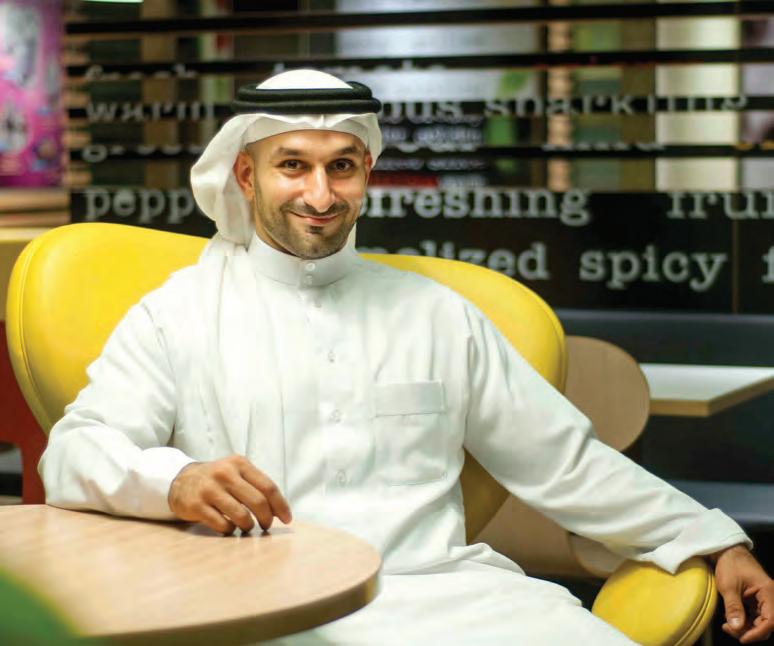
WINTER 2022–2023 / BABSON MAGAZINE 23
Abdulla Adel Fakhro ’03, MBA’08 at one of his McDonald’s franchises in Bahrain
multigenerational family business with tentacles in various industries.
“You need to be patient and a diplomat. I learned about building relationships, nancials, and HR at Babson,” Fakhro says. “My favorite professor was Len Green, who specialized in entrepreneurship for family business. He was a great character. Memorable. And his teaching method was hands-on and practical, with lots of real-life case studies.”
Although he always expected to return to the family fold, Fakhro says franchising makes good business sense for rst-time entrepreneurs, too, so long as you nd a reputable partner.
“The nice thing about franchising is you can grow quickly, regionally, globally,” he says. “With a good franchisor, you end up becoming more or less the same team. You bene t from each other’s resources.”
It helps if you like the product. His
go-to McDonald’s order? “I love Big Macs,” he says. “It’s always been a Big Mac.”
Finding Your Sweet Spot
Jeff Klein ’91 was an entrepreneur ever since he opened his rst childhood lemonade stand (he later diversi ed with lawn mowing). His parents ran a scrapyard demolition business, so the lifestyle seemed attainable—more so once he enrolled at Babson, where he selected classes that would prepare him to take over someday.
But, life took a different turn when his wife, a physician, was recruited to work in Las Vegas. Klein began working in medical device sales and at the same time obtained his mortgage broker’s license. Fortuitously, when a friend needed a home equity line of credit on his house to open a sandwich franchise, Klein ended up going in on the business, too. It was a low-stakes
decision that changed his life.
“It just was an investment for me.

We just kept growing and kept reinvesting the capital back into more locations,” he says, opening eight stores in two years.
“I think franchising makes business a little easier,” Klein says, noting that he has run his own restaurants without the same infrastructural support. “What I love about the franchise model is it’s basically plug and play: They help you with the real estate, they help you with the construction, they help you with the operations. They want to help you grow.”
Now, Klein owns 15 branches of Capriotti’s Sandwich Shops across two states, plus various Auntie Anne’s and Baskin-Robbins locations, among other food interests, as well as The Gents Place, an upscale men’s grooming salon. He also helps aspiring Babson franchise owners understand the process, and he’s candid about his challenges. For instance, during the pandemic, he invested in a mobile vet business wherein doctors would make house calls. However, it was a edgling idea and outside his sweet spot.
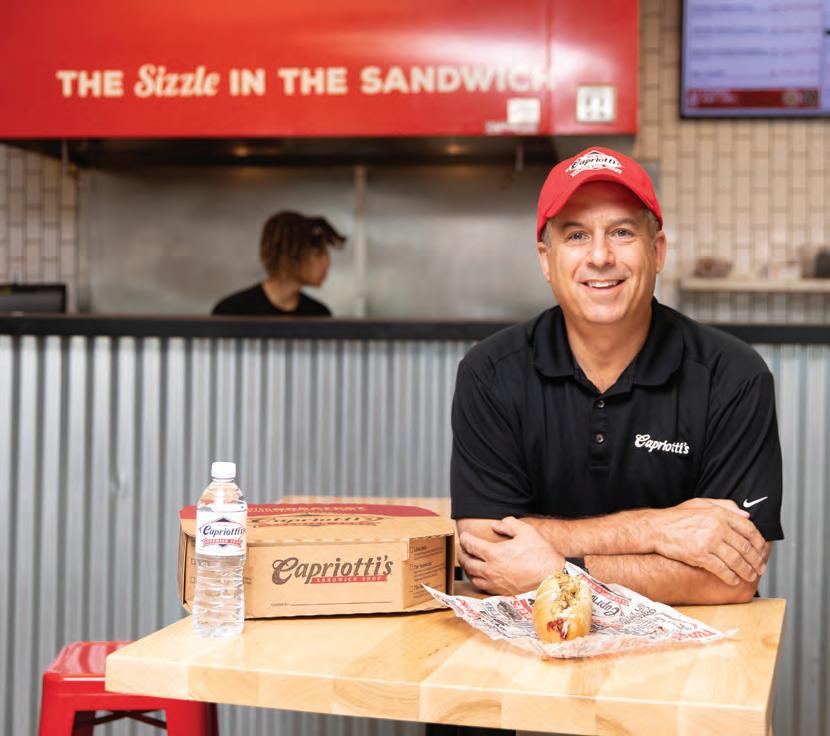
“Fantastic idea, and I even used the service. But, I didn’t know anything about the vets, or how to hire vets, and the franchise was newly emerging,” he says. “They only had a few locations around the country, and they didn’t offer the similar support like Capriotti’s or Baskin-Robbins.”
But, this kind of give-and-take is why entrepreneurship is so exciting— and, hopefully, rewarding.
“People come to Babson with an entrepreneurial spirit, and Babson teaches you that it’s OK to try and it’s OK to fail and that this is how you succeed,” Klein says.
PHOTO: RAY ALAMO
24 BABSON MAGAZINE / WINTER 2022–2023
Jeff Klein ’91 at Capriotti’s Sandwich Shop, one of his franchises in Las Vegas
Driven to Inspire A

lot has happened for Kate Jaspon ’98 since she last appeared in the pages of Babson Magazine for the Summer 2018 issue. Back then, she was CFO for Dunkin’ Brands, which included Dunkin’ and Baskin-Robbins and operated on an all-franchise model. She was instrumental in helping Dunkin’ and its franchisees weather the tumultuous first year of the pandemic, with projects that included negotiating new terms with lenders and suppliers on behalf of franchisees and helping them score scarce resources such as Plexiglas, hand sanitizer, and gloves.
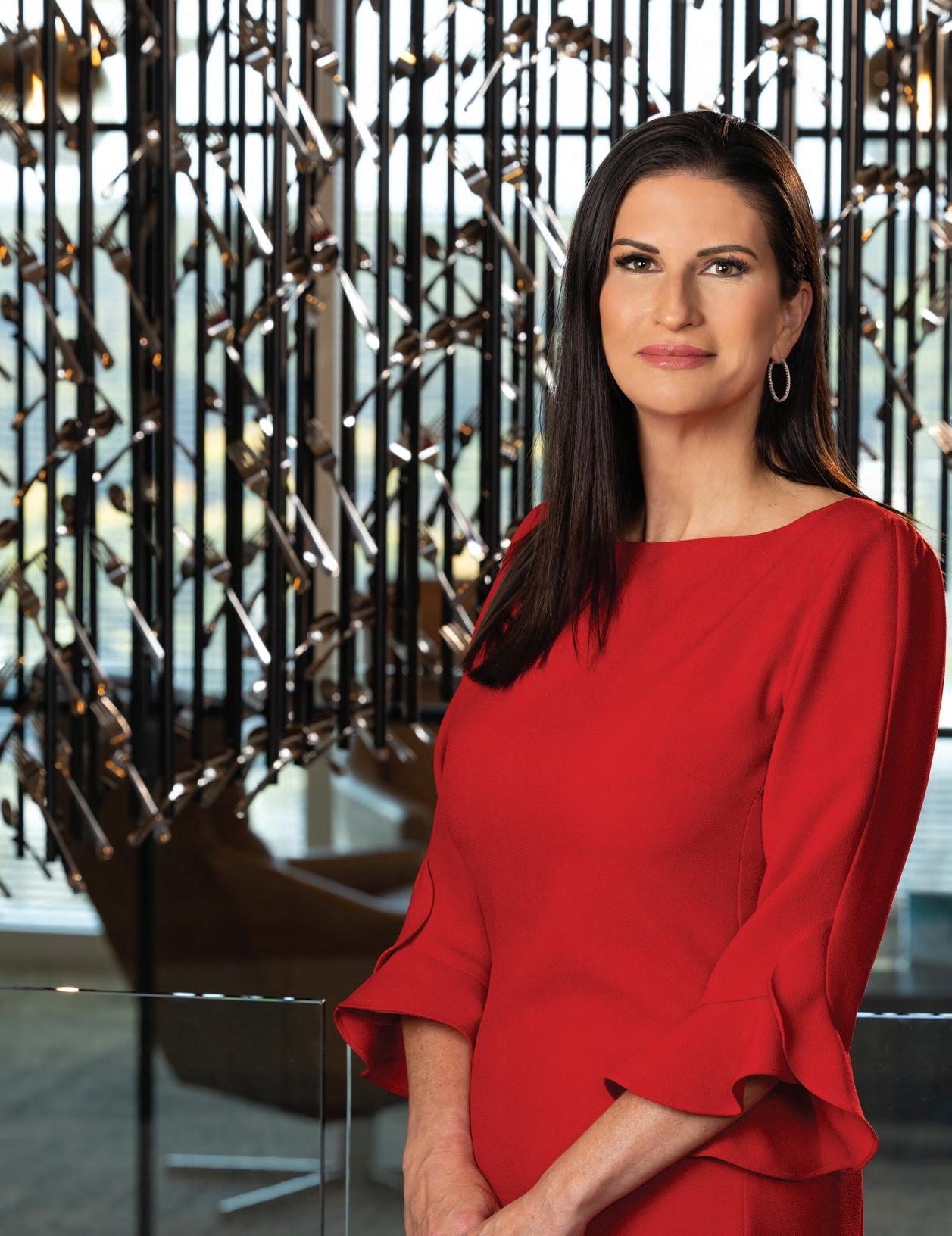



Then, in December 2020, Dunkin’ was acquired by Inspire Brands, in the second-largest take-private transaction in the restaurant space. (Inspire, a private equity-owned company, purchased Dunkin’ Brands, which was publicly traded on the Nasdaq.) The result is a portfolio of 32,000 restaurants across 70 countries, creating the second-largest restaurant company in the United States. Jaspon became CFO for Inspire in July 2021, relocating her family that summer to Atlanta, where the company is headquartered. She has switched from managing a Bostonbased staff of 100 to a staff of more than 400 people in five offices around the world. Inspire is 93% franchise-owned, with the company itself owning and operating more than 2,000 restaurants.

Jaspon believes the franchise model performed especially well at the height of the pandemic, in part because it provided business owners with built-in support as they faced unprecedented challenges. “For small business owners, it was amazing to have other small business owners and leadership teams at corporate,” she says. “They could hop on the phone daily, describe their problem, and work through it together.”
Given the challenges of the current market, “the franchising restaurant industry is ripe for consolidation,” Jaspon says. As business owners face the costs of upgrading digital technologies and third-party delivery services, for example, “it’s better for companies to come together to build scale.” Inspire aims for its brands to share more than finance and legal services. “We’re doing media buying, supply-chain purchasing, all of the IT build and commercial-service build behind all of the brands,” Jaspon explains, allowing franchisees to scale faster. “Business owners can rely on the franchisor to do things like protect the brand and innovate while they focus on building their business day to day.”
Over the past 17 years, Jaspon has witnessed significant shifts in the franchisee community. “We now have some second-, thirdgeneration franchisees who have earned business degrees and have really partnered with us to help us expand the business,” she says. The field is attracting an increasing number of new business owners and private equity investment and sponsorship. “With franchisor and franchisee relations so strong right now,” she adds, “I think you’re going to see more people making this choice.”
— Erin O’Donnell
PHOTO: MAVERICK STUDIOS
Kate Jaspon ’98, CFO of Inspire Brands
WINTER 2022–2023 / BABSON MAGAZINE 25
Women’s basketball player Madison Odam ’24 reflects on her hands-on experience with the sports brand, which recently announced a new relationship with Babson.
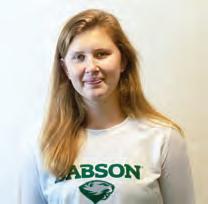
Madison Odam ’24 is honest. Before accepting a summer internship with Boston-based New Balance, she knew little more about the up-and-coming brand than that it struck a deal with NBA superstar Kawhi Leonard. After spending two months on the company’s campus in Brighton, the Babson women’s basketball player walked away with a far greater appreciation for the people behind the brand and an understanding of how to apply what she has learned at Babson to the real world.
As one of three interns—and the only one focused on product management—in New Balance’s team sports division, Odam learned about creating uniforms. “Product management is a very iterative process, and what makes New Balance special is the customer always comes rst every step of the way,” she says. “Beginning with each product you see, we gure out what materials are needed, develop a prototype, and once that is passed, produce a sample that can be tested and adjusted based on feedback.”
Odam’s internship strengthened the connection between Babson and New Balance, which jointly announced a new relationship and an apparel deal with current provider BSN SPORTS as well as several additional ancillary bene ts. Babson is the rst Division III institution to sign with the

multinational sports footwear and apparel manufacturer.
At New Balance, Odam also tried her hand at analyzing the market in a fast-paced environment. “We looked at which products were selling well and provided information to the sales team,” she says. “One of the things I took away from the experience is the importance of relationships with manufacturers because you have to get samples fast and at a good price point.”
Odam’s internship culminated with analyzing all of the product offerings at New Balance. “I played the role of a consultant and analyzed the product offerings to see which markets were growing and suggest where (the company) should continue to invest marketing and product development resources,” she says. “I also considered macroeconomic factors such as in ation and how it would affect the supply chain, allowing me to apply what I’ve learned at Babson.”
For Odam, who now plans to concentrate in nance and strategic management, the biggest takeaway from her time at New Balance was that great people make great companies. “Everyone was so welcoming, and it was such an inclusive environment,” Odam says. “The team sports division is a family within New Balance, and they made me feel involved in every process.”
— Jeremy Viens
PHOTO: JEREMY VIENS ATHLETICS 26 BABSON MAGAZINE / WINTER 2022–2023
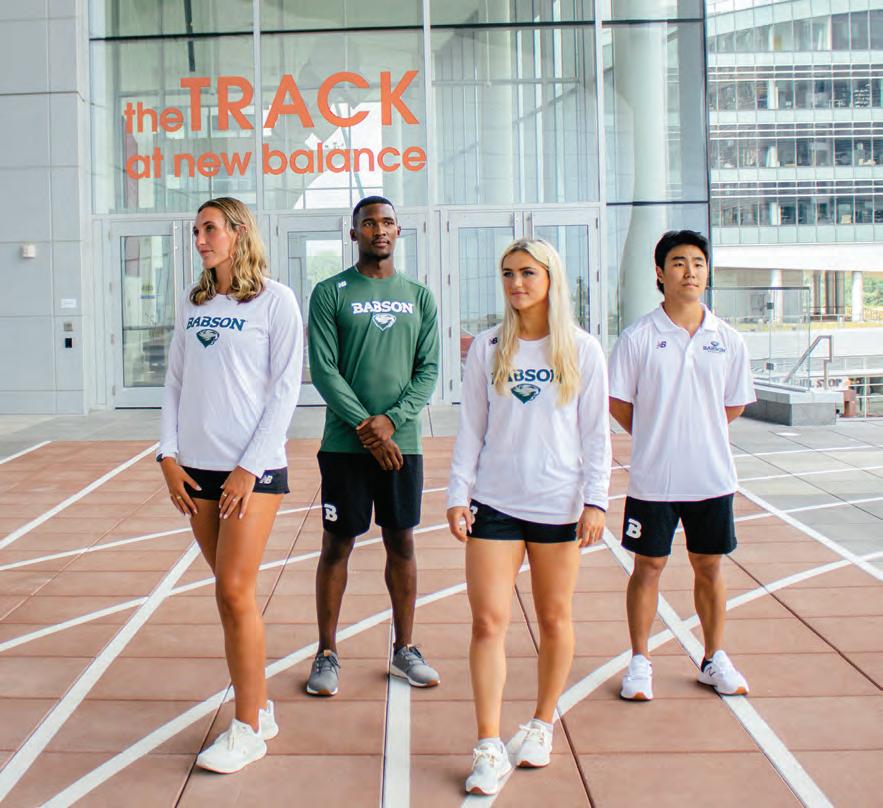
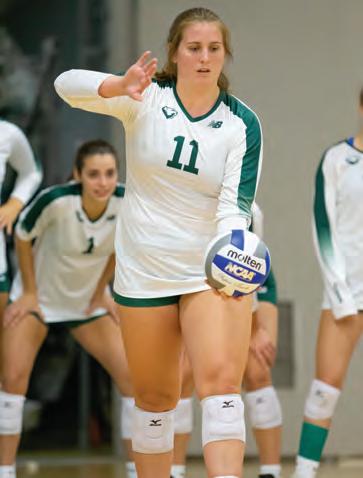
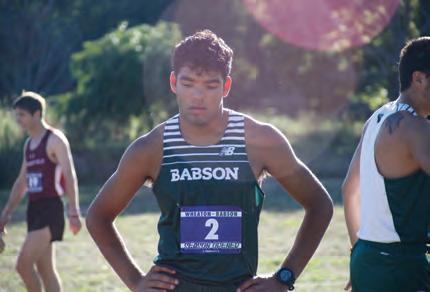
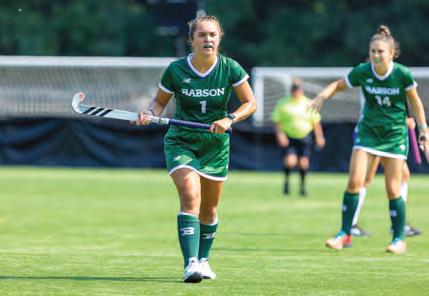
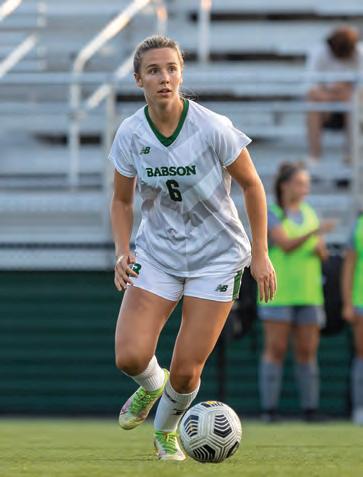
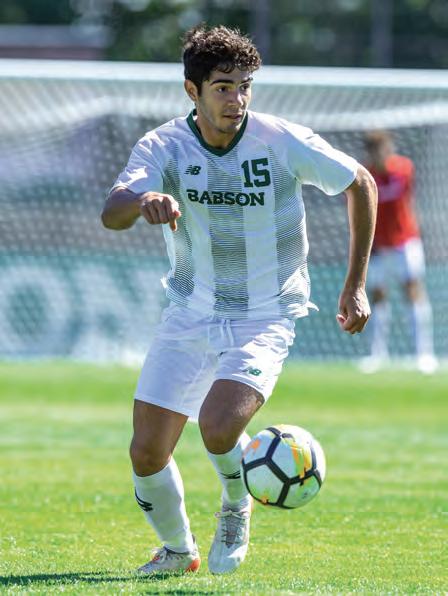
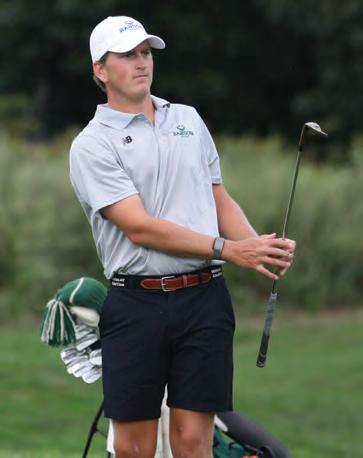


GOLF
WINTER 2022–2023 / BABSON MAGAZINE 27 FOR MORE
NEWS, VISIT: babsonathletics.com
SOCCER, FIELD HOCKEY, AND VOLLEYBALL PHOTOS: JON ENDOW GROUP PHOTO: TEMI BAJULAIYE & CASSIDY RILEY ’22, M’23
PHOTO: JEREMY VIENS CROSS COUNTRY PHOTO: LAUREN ZATULOVE ’23
SPORTS
Babson student-athletes display and compete in their new uniforms after the College became the first Division III institution to sign with Boston-based New Balance in a deal that includes apparel through BSN SPORTS as well as several additional ancillary benefits.
SPOTLIGHT
CENTENNIAL CAMPAIGN

The Centennial Campaign has always been about more than celebrating Babson’s first 100 years. It has been about transforming the College for its next 100 years. The campaign, which launched in 2016 ahead of the Centennial in 2019 with a goal of $300 million, has become the most successful fundraising effort in Babson’s history, surpassing $450 million in total contributions toward a more ambitious goal of $500 million by the end of the fiscal year in 2023. The continued support of the Babson community has helped spur transformations to the College’s physical campus, its academic experience, and its student body.


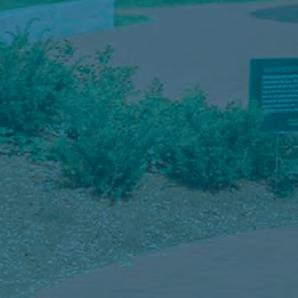


To commemorate the Centennial, the park named for the College’s 13th president opened in spring 2019 with the relocation of the Babson World Globe, which was restored and hand-painted.
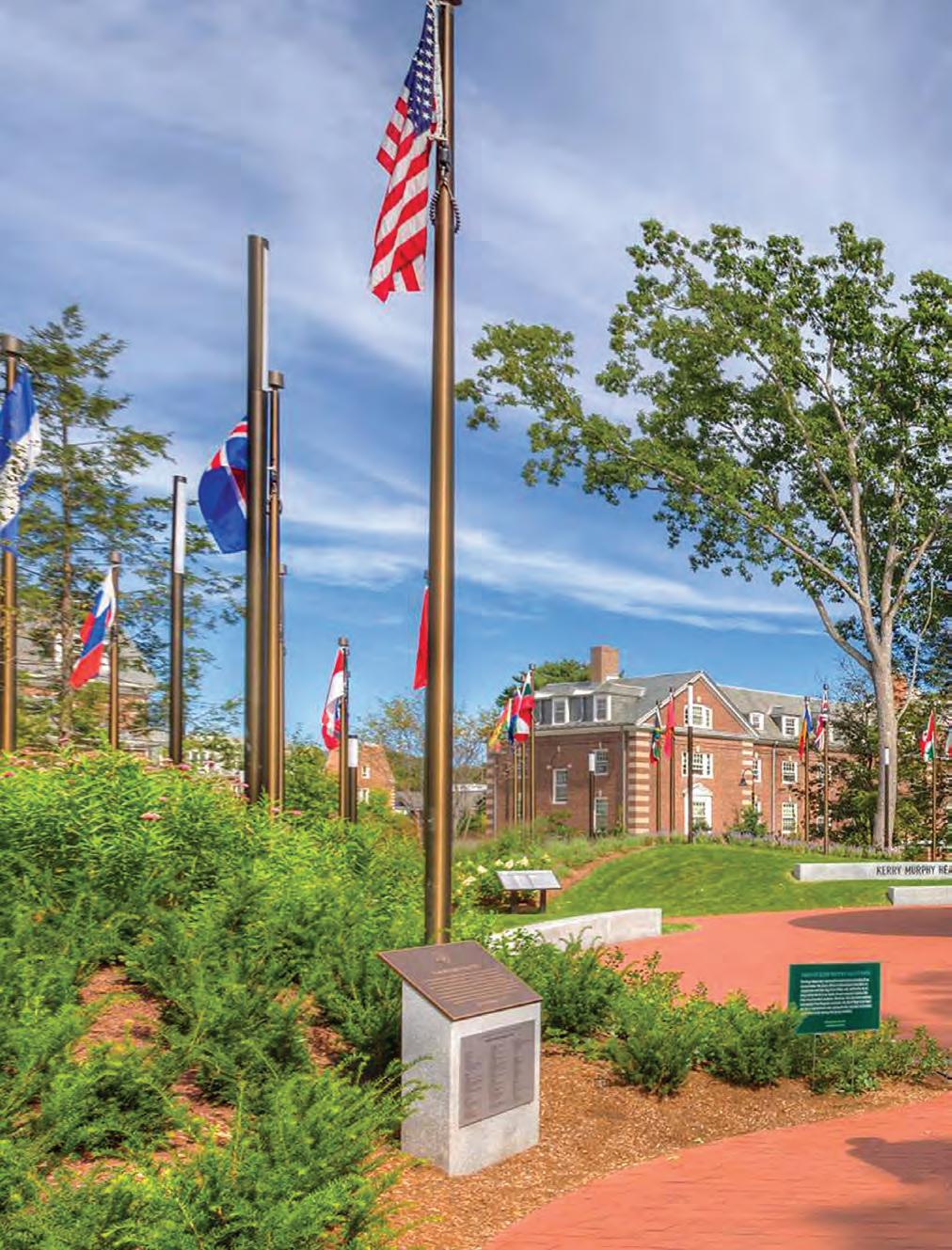
HERE IS A LOOK AT THE CAMPAIGN’S ENDURING IMPACT:
THE
THE IMPACT OF
Kerry Murphy Healey Park
28 BABSON MAGAZINE / WINTER 2022–2023 ADV ANCEMENT
Babson Commons






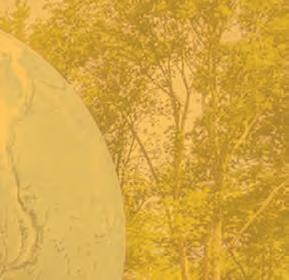






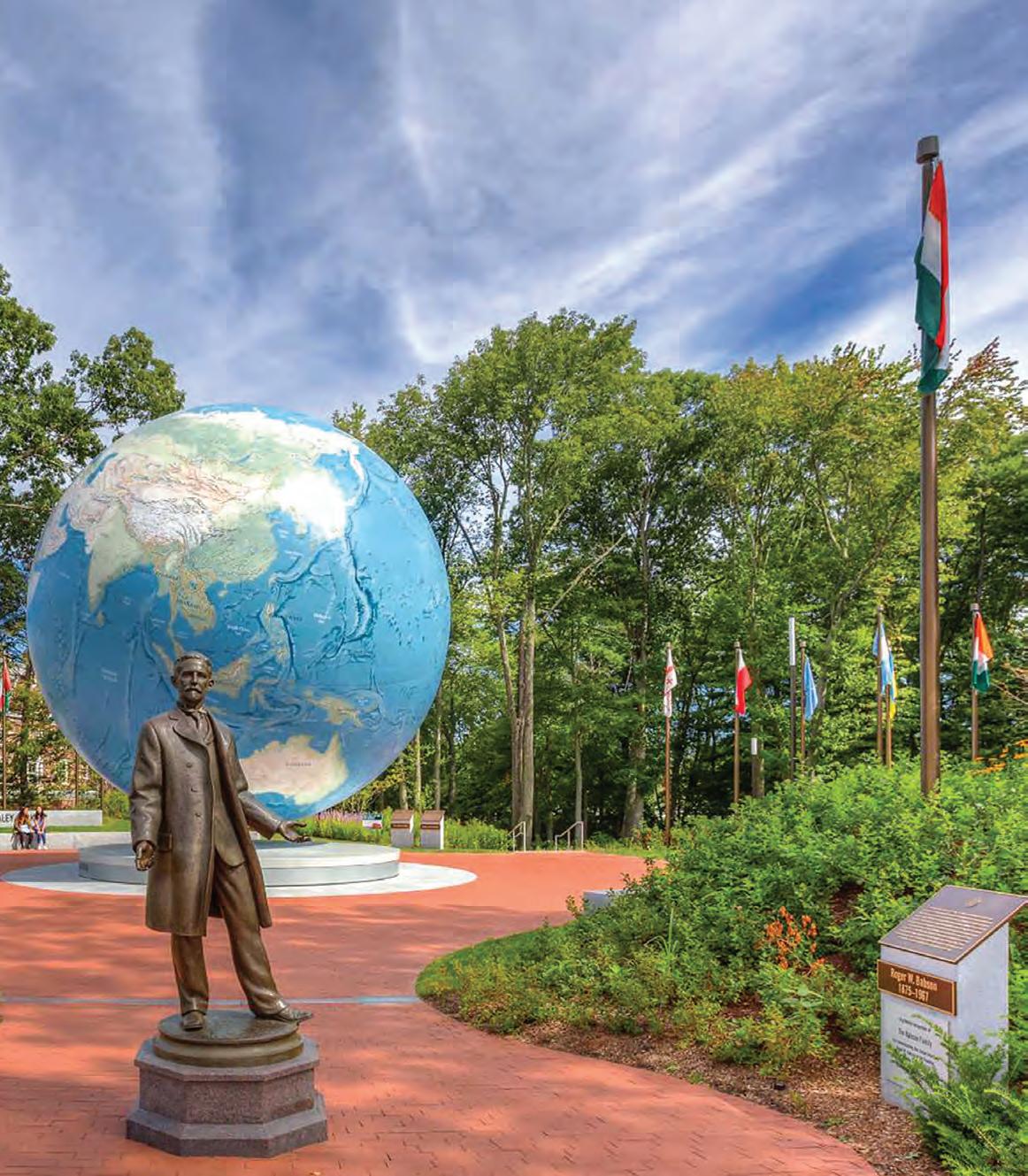
Scholarships Other master renovations
The 10,000-
addition created
home for the Stephen D. Cutler Center for Investments and Finance,
classroom, and
Centennial Cafe, and offers better accessibility
Library. Major renovation and expansion added nearly 70,000 square feet of new construction, including a three-court recreation center and an air-conditioned convocation area. 10 TERM CHAIRS have been created during the campaign • Horn Library • Winn Auditorium • Forest Hall • Pietz Hall • Tennis courts relocated Opened in 2018, the 10,000-square-foot building provides tools and resources for students to create and collaborate. Global Scholars $30,523,647 Other scholarships $74,095,985 Len Green Recreation and Athletics Complex Weissman Foundry WINTER 2022–2023 / BABSON MAGAZINE 29
square-foot
a new
a 48-person
a larger
to Horn
Babson Connect Worldwide (BCW) is an annual summit of global entrepreneurial leaders committed to building a better world through innovation and collaboration. Hosted by Babson College—the world leader in entrepreneurship education for more than 25 years—the summit serves as a reflection of what makes the institution shine: collaboration, innovation, and entrepreneurial leadership.


CONNECT WITH BABSON IN MIAMI
FEBRUARY 2–4, 2023 / MIAMI THE RITZ-CARLTON, SOUTH BEACH REGISTER NOW! bcw.babson.edu 30 BABSON MAGAZINE / WINTER 2022–2023 ADVANCEMENT SPOTLIGHT
BCW SPOTLIGHT SESSIONS
Miami Rising: Fostering an Entrepreneurial Ecosystem
Thriving entrepreneurial ecosystems are no accident. They are the result of combined efforts from leadership, local government, investors, educators, and entrepreneurs to dedicate resources and networks to earning advocates. Hear from this panel of architects who have designed and built Miami’s entrepreneurial community.
Toward a Blue Economy: A Promise for Sustainable Growth Benefiting People and Planet
From renewable energy and maritime transport to ecotourism and nature-based solutions, the world’s oceans and seas will sustain people and the planet for generations to come, but only if its economic value is derived sustainably. In this session, learn about the emerging research driving new investment and blue business opportunities from an early World Bank pioneer in this space, and hear from experts in science and innovation driving this $3 trillion to $6 trillion economic ecosystem.
The Business of Authenticity
Join Aaron Walton ’83, chief executive of cer of Walton Isaacson, as he sits down with two of the fashion world’s most accomplished and astute talents to discuss the entrepreneurial drive that has allowed them to grow and evolve both personally and professionally. Consumers are not only craving this brand of authenticity from in uencers and celebrities but they also are increasingly demanding it.
Other sessions and workshops include:
• Workshop: Cultivating Entrepreneurial Youth Leaders for a World on Fire
• Workshop: The Power of Values-Based Leadership
• The Future of Franchising: Pathway to Wealth Creation and Global Opportunities to Scale
• Global Cybersecurity: The Opportunity for Innovation and Challenge of Protection
• Family Matters: Succession Planning with the Next Generation
ALUMNI SPEAKERS
AMONG THE FEATURED SPEAKERS FOR BCW ARE A HOST OF BABSON ALUMNI, INCLUDING:
MARC BELL ’89
Co-founder, chairman, and chief executive of cer, Terran Orbital Corporation
Master of Ceremonies: CARLA CURIEL ’05 Co-founder, CEO, EP, and creator, Lanugo Media Inc.
SOMIA FARID SILBER ’15
Babson trustee, and president, Edible Brands
ERIC JOHNSON ’72, P’08 (ADE 2019) Babson trustee, and chief executive of cer, Baldwin Richardson Foods
STEPHEN SPINELLI JR. MBA’92, PHD President, Babson College
MARK SUTTON MBA’09
Senior vice president, chief information security of cer, Bain Capital, LP
GUSTAVO TRINDADE MBA’17 Director, Babson College Miami
WINTER 2022–2023 / BABSON MAGAZINE 31
NEWS NOTES AND NODS
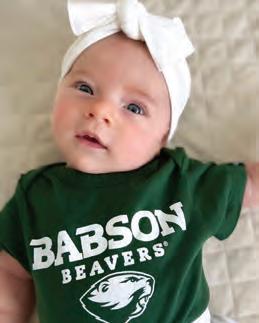
UNDERGRADUATE
1959
Larry Fitzmaurice ’59 moved to Bluffton, South Carolina, after living most of his life in Wellesley, Massachusetts. “It is an adjustment, but I am assimilating well,” he wrote. “What I do miss are my New England friends, civic activities, and my personal involvement with various Babson volunteer activities.” Fitzmaurice was thrilled to read about one of those New England friends recently. “I enjoyed the summer issue of Babson Magazine, and particularly the piece about Donna Stoddard, a former Wellesley friend and neighbor.”
1974
Carlos M. Echeverría ’74, MBA’76 moved to Costa Rica and reports that he is active physically and mentally and is writing a lot for the local media and attending radio and TV events.
1982
Kenneth G. Romanzi ’82 was appointed chairman of the Moonstone Nutrition board of directors in August. Moonstone Nutrition is a Pittsburgh-based kidney health nutraceutical company. Romanzi, who serves on the Babson Board of Trustees, is the former president, CEO, and director of B&G Foods, a $2 billion public food company; and a pioneer who led entrepreneurial ventures at companies such as Ocean Spray, Earthbound Farm Organics (Danone/WhiteWave), Nabisco, Cadbury Schweppes, Balducci’s, and Naked Juice. Salim Rayes, president and CEO of Moonstone Nutrition, said Romanzi’s “appointment comes at a pivotal moment as our company continues to grow and create a new kidney health category at retail. Ken’s deep experience and leadership in building brands through superior marketing and innovation will be invaluable to our company.”
1988
Peter B. Cosco ’88 sold his advisory firm, 4Forces Group, LLC, on July 18 to independent investment firm Isos Capital Management. Cosco will stay on as managing director at Isos, overseeing the advisory process and supporting the firm’s core investment business.
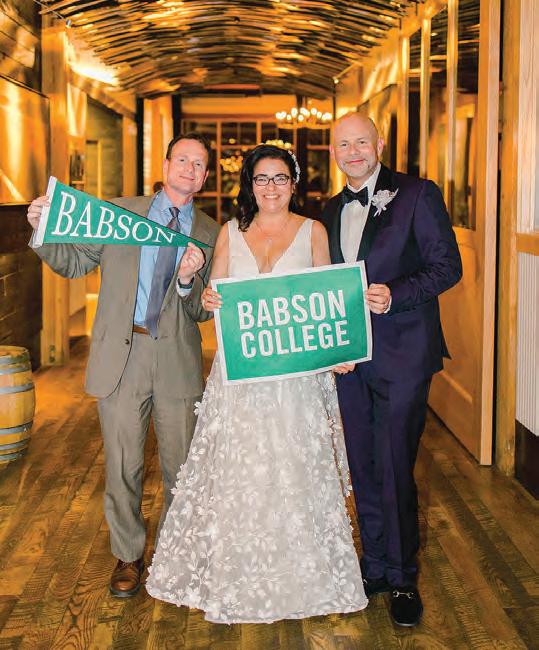
Jonathan Cignetti ’98 and Pat Cutter ’01, both former Babson baseball players, coached their sons together in the Hingham (Massachusetts) Little League majors division in the 2022 season. The two 12-year-old boys, who played for the Pirates, wrapped up their last Little League season in mid-June. Cignetti has been coaching his son since 2015, and Cutter moved to Hingham a few years ago, according to Jonathan’s wife, Erin Cignetti ’99. “It was fun to see them coaching together after I watched them play baseball together more than 20 years ago,” Erin Cignetti wrote.
Isos Capital, located in Westport, Connecticut, has established itself as an independent investment firm focused on the global media, entertainment, sports, and technology industries. Cosco founded 4Forces Group after a career as a media industry executive, building a reputation as a change agent helping companies grow through strategic planning and
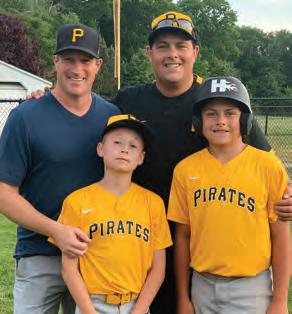 Audrey Klebanow ’93 married William McGann ’93 on May 12 in Park City, Utah. The couple has five children, as well as four dogs, seven alpacas, three donkeys, chickens, ducks, and goats. Fellow classmate Stephen Paquelet ’93 attended the wedding celebration.
Craig R. Benson ’77, H’03, who serves on the Babson Board of Trustees, welcomed a new granddaughter, Ava Michelle, who was born May 19.
Audrey Klebanow ’93 married William McGann ’93 on May 12 in Park City, Utah. The couple has five children, as well as four dogs, seven alpacas, three donkeys, chickens, ducks, and goats. Fellow classmate Stephen Paquelet ’93 attended the wedding celebration.
Craig R. Benson ’77, H’03, who serves on the Babson Board of Trustees, welcomed a new granddaughter, Ava Michelle, who was born May 19.
32 BABSON MAGAZINE / WINTER 2022–2023
Dina (Kassis) Gray ’98 opened a new behavioral health business in January 2021 aimed at helping autistic children and adults gain more independence. Gray’s new company, ABA Helps, provides homebased Applied Behavior Analysis (ABA) therapy for children and adults affected by autism and other related conditions. ABA therapy is a type of interpersonal therapy used to treat issues with communication, motor skills, and behavioral disorders. Gray, the founder and CEO, launched ABA Helps with a mission to impact the lives of many individuals affected by autism and to help them acquire adaptive skills in homes, schools, and communities. “I am so thrilled with all our accomplishments and proud of our talented clinical team, who is committed to delivering high-quality care to the families we serve,” Gray said.
finding operational efficiencies. “In my experience, post-merger success is realized not only through strategic synergies, but by having a clear cultural alignment,” Cosco said. “The partnership between Isos Capital and 4Forces Group has both in spades, and I couldn’t be happier to join the team.”
1999
Charles Gaudet ’99 recently was named one of Disrupt Magazine’s 15 Top Business Coaches Crushing 2022. Gaudet is listed along with well-known leadership coaches such as Tony Robbins, Grant Cardone, Marshall Goldsmith, and others. Gaudet also was named in the Los Angeles Tribune’s list of Top 13 Business Experts to Follow in a Recession.
2017
Jordan Shamir ’17 announced that a new company she co-founded, BotNot, is in the pre-seed round. Merchants can
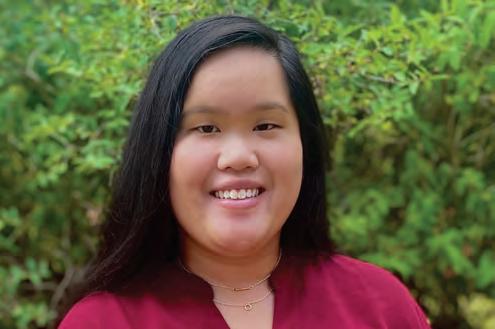
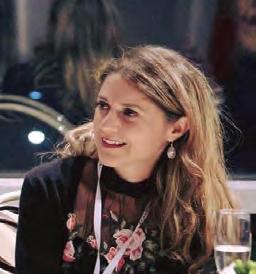
install BotNot on their website and use it to identify bots abusing coupon codes or returns. BotNot also helps identify a company’s real customers as opposed to bots, giving companies better data to use for marketing. “Knowing your consumers allows you to build a successful brand that your consumers love,” the BotNot website reads.
2022
Anna Nickerson ’22 attended a 10-day educational trip to Israel in July as part of a Jewish National Fund program called the Caravan for Democracy Student Leadership Mission. The trip is a fully subsidized educational program for student leaders who have never been to Israel. The participants visited historic locations such as the Holocaust museum in Israel and met figures such as Rami Nazzal, a Palestinian journalist working for Time magazine who lives in East Jerusalem. “I had an absolutely amazing experience,” wrote Nickerson of the trip.
The
Fernando Morales ’99 had an impromptu Babson meet-up while at the Rafa Nadal Academy in Manacor, located in Mallorca, Spain. He was dropping off his two sons for their first day at tennis camp when he struck up a conversation with two other parents, and he soon learned that they were Babson alumni, too.

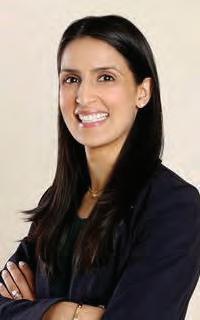
“The Babson network is strong all over the world,” Morales wrote, pointing out that he is from Panama, May Lim ’03 is from Hong Kong, and David Fernandez Neila MBA’05 is from Spain.
According to Deloitte, Adatia “is honored and thrilled to accomplish this significant career milestone which, in addition to hard work, would not have been achieved without her mentors, advocates, and sponsors guiding and championing her throughout the process.”
Miguel Vázquez Jr. ’12 was recently listed as one of the Hartford Business Journal ’s 40 Under Forty in 2022. Vázquez made the list due to his work as a senior development manager at Network for Teaching Entrepreneurship (NFTE), where he is leading the fundraising efforts for the New England region. Vázquez’s board leadership with Prospanica, and his community involvement through his church were other reasons he made the list.
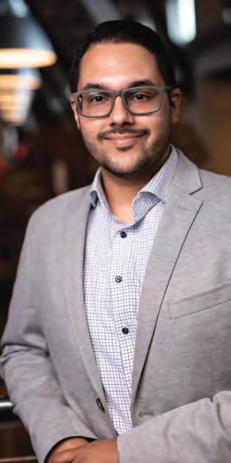 Tahira Adatia ’10 was listed in Deloitte Canada’s 2022 partner class in July.
Employees in the group, according to Deloitte Canada’s announcement, are “dedicated professionals who have clearly demonstrated that they possess the skills, dedication, and motivation to grow their careers and help our organization flourish in the years ahead.”
new partner class reflects hard-earned recognition for leaders who have demonstrated outstanding performances and brought Deloitte’s shared values and purpose to life.
Tahira Adatia ’10 was listed in Deloitte Canada’s 2022 partner class in July.
Employees in the group, according to Deloitte Canada’s announcement, are “dedicated professionals who have clearly demonstrated that they possess the skills, dedication, and motivation to grow their careers and help our organization flourish in the years ahead.”
new partner class reflects hard-earned recognition for leaders who have demonstrated outstanding performances and brought Deloitte’s shared values and purpose to life.
WINTER 2022–2023 / BABSON MAGAZINE 33
Kaity Goodwin ’22 recently started as the fourth Take the Lead Fellow for the Boston Red Sox in August. Goodwin will work with the community relations department and spend four weeks with other local sports organizations, including the Boston Bruins, Boston Celtics, Boston Pride, New England Patriots, and the New England Revolution. The Take the Lead program was created by city and state officials along with local professional sports teams to advance diversity, equity, and inclusion at all levels in Boston-area professional sports. Goodwin, who had served as Babson’s mascot, Biz E. Beaver, said she looks forward to being able to create a positive impact in her new role.
to the day after
first
“We’ve been dreaming of being in
got
Thorsgaard
Her best friend, Sarah
’14, was not only partially responsible for Thorsgaard’s decision to attend Babson, but Whitaker also introduced the bride to her husband-to-be on orientation day in 2010. The couple started dating two years later when Thorsgaard joined Palazzi and his two friends, Brett Rosen ’14 and Alex Packer ’14, on a skiing day trip to Cannon Mountain. Palazzi proposed on the same mountain in 2019. “Sarah was my maid of honor, and Brett and Alex were both Mauricio’s groomsmen,” Thorsgaard wrote. “I just wanted to share the photo and the story and say how happy we all are to have met at Babson—so thankful for the lifelong friendships and connections we made there!”

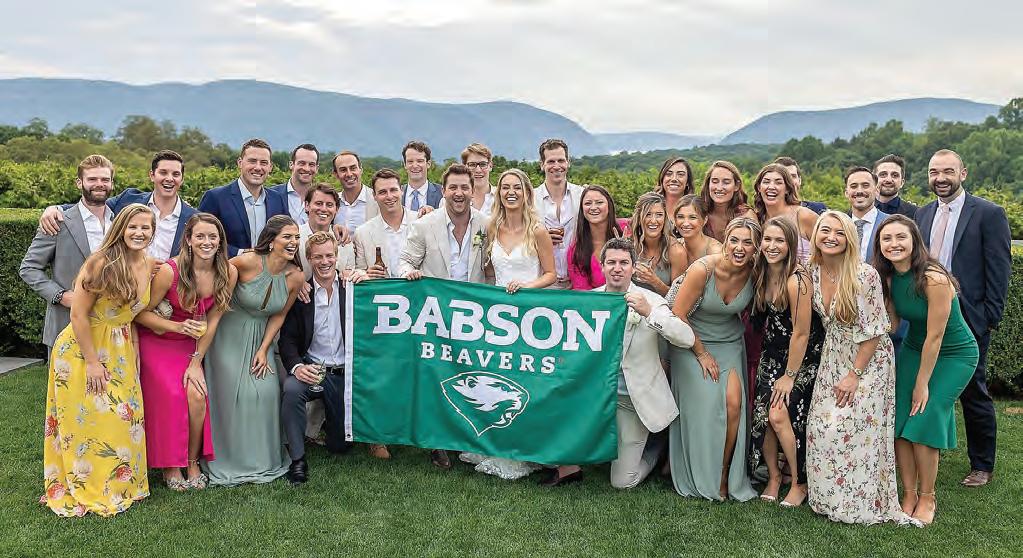 Ben Kravitz ’14 married Allison Windsor ’16 on August 5. While at Babson, Kravitz played hockey and Windsor played lacrosse. The pair was surrounded by several former Babson teammates and college friends at the summer ceremony.
Ben Kravitz ’14 married Allison Windsor ’16 on August 5. While at Babson, Kravitz played hockey and Windsor played lacrosse. The pair was surrounded by several former Babson teammates and college friends at the summer ceremony.
34 BABSON MAGAZINE / WINTER 2022–2023 NEWSNOTES ANDNODS
Mauricio Palazzi ’14 married Abby Thorsgaard ’14 on March 14 in a Miami ceremony that occurred 10 years
the couple
started dating as Babson sophomores.
Babson Magazine since we
engaged,”
wrote.
Whitaker

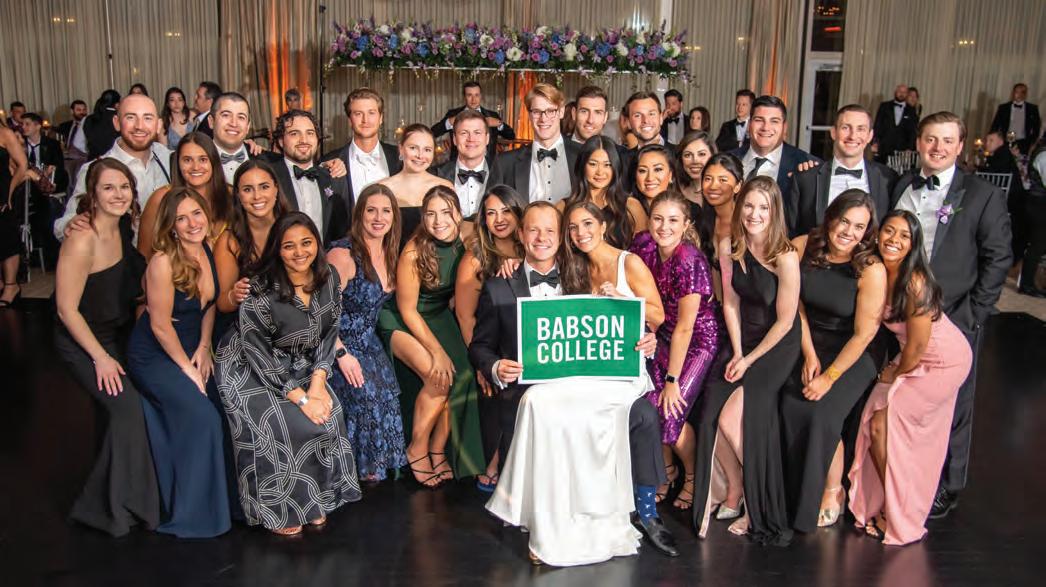 Jon Dainesi ’15 married Ella Overholt ’15 on June 4 at the Snowpine Lodge in Alta, Utah. More than 20 Babson alumni attended the wedding. From left to right: Kyle Bissell ’17, Anton Pronichenko ’17, Nick DeMartino ’15, Kyle Morrisey ’13, Taylor Welsh ’16, Alex Prentice ’15, Billy Affsa ’15, Katie Hunt ’15, Graham Anderson ’15, Dainesi (groom), Overholt (bride), Phil Turpin ’15, Christian Gordon ’14, Jared Silber ’15, Ryan Diplock ’15, Somia Farid Silber ’15, Victoria McKay ’15, Carter Dowd ’16, Danielle Brasher ’15, and Kate Began ’15.
Jon Dainesi ’15 married Ella Overholt ’15 on June 4 at the Snowpine Lodge in Alta, Utah. More than 20 Babson alumni attended the wedding. From left to right: Kyle Bissell ’17, Anton Pronichenko ’17, Nick DeMartino ’15, Kyle Morrisey ’13, Taylor Welsh ’16, Alex Prentice ’15, Billy Affsa ’15, Katie Hunt ’15, Graham Anderson ’15, Dainesi (groom), Overholt (bride), Phil Turpin ’15, Christian Gordon ’14, Jared Silber ’15, Ryan Diplock ’15, Somia Farid Silber ’15, Victoria McKay ’15, Carter Dowd ’16, Danielle Brasher ’15, and Kate Began ’15.
WINTER 2022–2023 / BABSON MAGAZINE 35
Olivia Karow ’15 married Aaron Pomeroy ’15 on April 30 at Brae Burn Country Club in Purchase, New York. They were joined by 30 Babson alumni, Karow said.
CONNECTIONS
BACK TO BABSON
2022 VOLUNTEER LEADERSHIP AWARDS

During Back to Babson, the College honored the alumni and friends who have risen to serve the community at the 2022 Volunteer Leadership Awards celebration. Babson offers heartfelt congratulations to the winners:
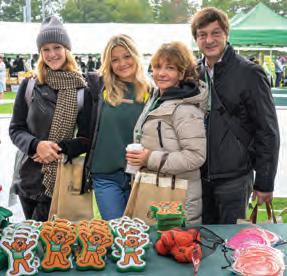
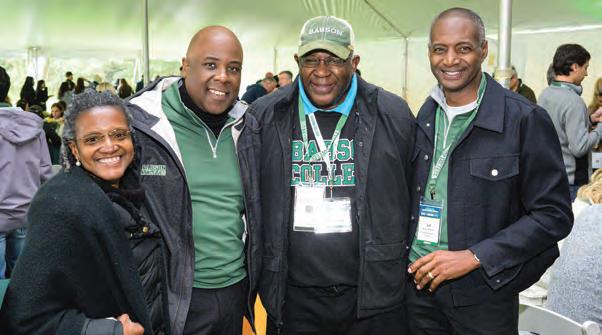
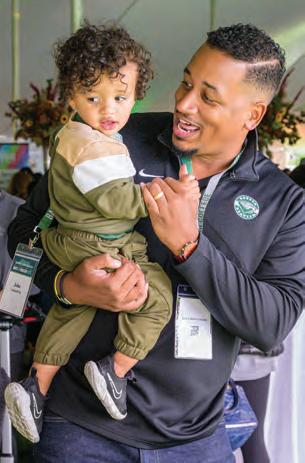
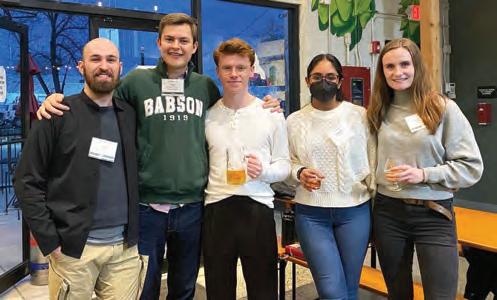
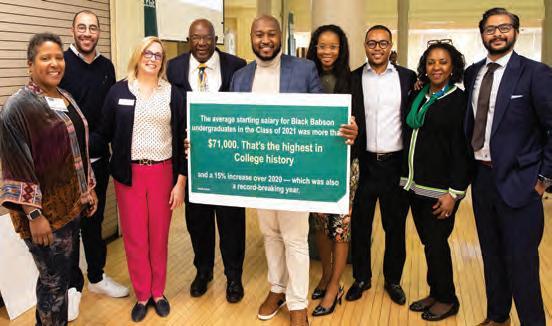
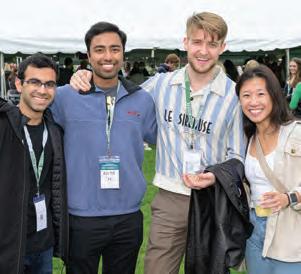
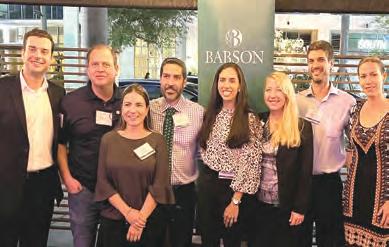
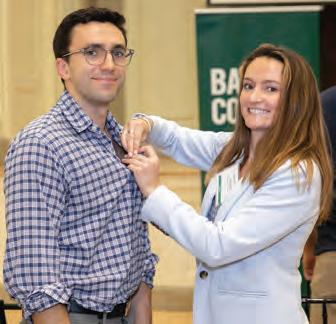
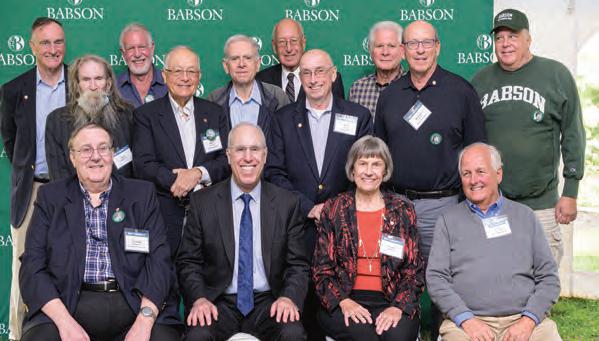
Cruickshank Alumni Leadership Award Lupo del Bono ’79, P’09
The Richard J. Snyder Distinguished Service to the College Award
Christopher Malone ’00, MBA’07
The Distinguished Recent Alumni Award Drew Darling ’14
The Joseph R. Weintraub Alumni Award for Distinguished Faculty/Administrator Service Cindy Klein Marmer MBA’02
The John H. Muller Jr. Parent Leadership Award Elaine R.
2
Shatiek Gatlin ’16, Nitiya Walker ’14, Chris West ’18, Sadie Burton-Goss, and Adi Pathak MBA’20 display the exciting update about Black alumni in the Class of 2021.
Babson College kicked off its commemoration of the 50th anniversary of Title IX and the celebration of women’s athletics at a ceremony February 12, recognizing some of the founding members of each women’s program, including Marion Browning ’77 (basketball), Maria Serpentino ’78, P’05 (basketball), Ellen Maher ’84 (basketball, soccer), Diane Gardner ’85 (field hockey), Dee Kates ’85 (field h
Babson teamed up with Idle Hands Craft Ales on April 7, National Beer Day, to host an exclusive tour and tasting with founder and president Christopher Tkach MBA’06. Pictured (left to right): Jacob Crespin ’18, Caleb HarbisonWursten ’19, Brock Eveleth ’19, Vasundhra Puri ’19, and Cayla Murphy ’20.
The sixth annual Sunshine State Swing featured a garden party, polo match, and happy hour. Pictured (left to right): Victor Perez-Abreu ’17, Greg Santin ’92, Mariana Yepes ’20, Jose Diaz ’01, Carla Curiel ’05, Heidy Frank MS’03, Gustavo Trindade MBA’17, and Marcela Zamora Erana ’00, P’26 at alumni-owned Tap 42 Craft Kitchen & Bar.
Andrew Paul Piispanen ’18 and Hannah E. Piispanen ’22 take part in the Legacy Pinning Ceremony, a Commencement Week tradition that celebrates the special connection Babson shares across generations of families.
The newest class of Half-Century Club members was inducted and enjoyed a trolley tour through campus. Front row: Richard Battistoni ’72; President Stephen Spinelli Jr. MBA’92, PhD; JoAnn Lyndon MBA’72; Cyrus Clark ’72. Middle row: Paul Riddell ’72; Bruce LoBuono ’72; Bob Lash ’72; Bertram Polan ’72; Geoffrey Eiten ’72. Top row: Chris Hennessey ’72; Roger Carran ’72; Salomon Josue ’72, MBA’73; Gino Angelone MBA’72; Dale Swiggett MBA’72.
Bonifacic P’20 ’22 ’23
Vice President and Dean of Campus Life Lawrence P. Ward hosted the annual Babson Black Alumni Alliance (BBAA) Friends and Family BBQ. From left: Connie Martin-Wilson MBA’10; Ward; Gerald Watson ’76, BBAA founding chair; and Jeffery Perry ’87, P’23, chairman of the Board of Trustees.
John Campbell ’11 and son John Campbell Jr.
Each year, the Tent with its all-you-can-eat-BBQ, music, giveaways, doggie saloon, inflatables, balloon artists, and more draws large crowds, including the next generation of Babson students.
36 BABSON MAGAZINE / WINTER 2022–2023 NEWSNOTES ANDNODS
This favorite College tradition brought alumni, parents, students, faculty, and staff Together Under the Tent to enjoy great company, good food, and some friendly competition, and to create lifelong memories with friends—old and new.
GRADUATE 1980
Louis Bibeau MBA’80 founded Logistik Unicorp (LU) in Canada in 1993 and recently announced LU is expanding to Togo in West Africa. LU provides uniforms and other managed clothing services for corporate and governmental organizations such as law enforcement and national defense entities. The company has steadily expanded and is now operating in Europe, Asia, the Middle East, and North Africa, wrote Felipe Haristoy-Lavin MBA’08 Haristoy-Lavin, director of supply and procurement at LU, credits Bibeau for the many milestones. “I’m currently working for LU,” he wrote. “(Bibeau’s) success story has built a global company.” Examples include LU’s new hub in Vietnam ensuring the international supply chain delivers ethical sourcing, the acquisition of Australian Defence Apparel (ADA), as well as a new garment factory LU plans to build in Togo.
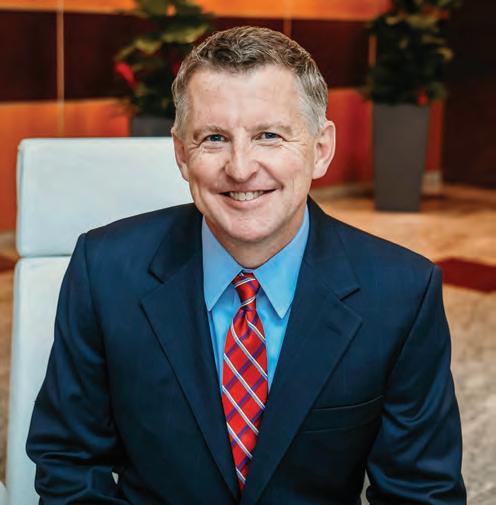
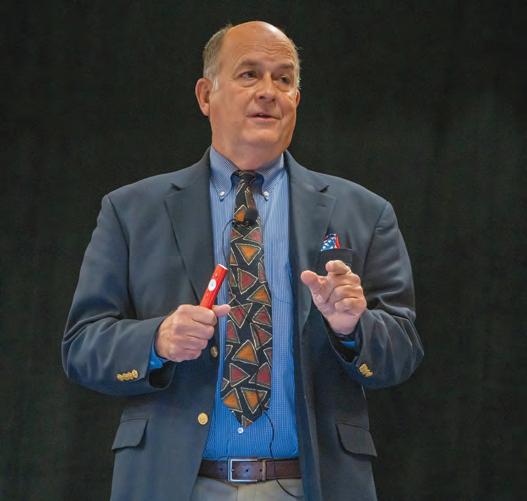
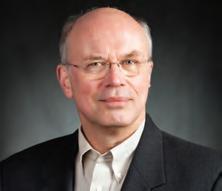
1995
Jeannie Freis MBA’95 published a book titled Surviving Single Parenthood Freis shares her journey through a combination of anecdotal tales, survival tips, and tricks acquired along the way. The book is available at Amazon, Walmart, Target, and Bookbaby.com.
Rosemary Sheehan MBA’95 was appointed to chair Big Brothers Big Sisters of Eastern Massachusetts’ board of directors in August. Sheehan, chief human resources officer at Mass General Brigham, has served on the board since 2019. “The pandemic has highlighted the inequities in our society and created a massive mental health issue,” Sheehan said. “I look forward to supporting the new strategic plan and helping the nonprofit play a pivotal role in supporting our youth as the new board chair.”
2008
2019
ANCORE, a fitness company founded by Nathaniel Herring MSEL’19 and Isaac Lewis MSEL’19, has been tapped by the National Hockey League to provide its flagship product, the ANCORE Pro, in NHL locker rooms. The portable cable machine, which is about the size of a
John Peters MBA’78 recently co-wrote two articles published in the peer-reviewed journal AELE Public Safety. The journal is a publication of the Americans for Effective Law Enforcement (AELE), a not-for-profit organization focused on the best legal, scientific, and evidence-based law enforcement programs. Peters co-wrote one article on scholarship as an integral part of leadership, and another on the liquid impedance of spit restraint devices.
Edward Nilsson MBA’97 contributed a chapter in the recently published book Urban Modernity in the Contemporary Gulf. The chapter—titled “History, memory and narrative of the past and future: The new souks in Kuwait”—is about Nilsson’s work in Kuwait with The Architects Collaborative (TAC). TAC is an architectural firm started in 1945 in Cambridge, Massachusetts, known for its postwar modernism style. Nilsson also appeared in a program now available on YouTube called “On Architecture: A Conversation About Ada Louise Huxtable,” where he presented his paper “No Place Like Home—Ada Louise Huxtable’s Ranch House as Her Housing Ideal,” and participated in conversations about Huxtable while on the program.
water bottle, allows the user to practice resistance training on the go. The NHL announced September 9 that the ANCORE Pro is now league-mandated in every visitor locker room, meaning that all 32 NHL teams are required to have ANCORE products. “What’s better than training with the same gear as the pros?” co-founder Lewis asked in an announcement. Mike Carlson MBA’19, ANCORE’s first employee, wrote that the Salem, Massachusetts, business is “a Babson company through and through. To say we are proud of our Babson roots is an understatement!”
 Felipe Haristoy-Lavin MBA’08: See 1980, above.
Neil Geary MBA’01 was hired by The Procopio Companies to serve as the company’s first chief financial officer. Geary, who has more than 25 years of experience in real estate development and financial management, will be responsible for the financial oversight of Procopio’s rapidly expanding portfolio of national developments.
Felipe Haristoy-Lavin MBA’08: See 1980, above.
Neil Geary MBA’01 was hired by The Procopio Companies to serve as the company’s first chief financial officer. Geary, who has more than 25 years of experience in real estate development and financial management, will be responsible for the financial oversight of Procopio’s rapidly expanding portfolio of national developments.
WINTER 2022–2023 / BABSON MAGAZINE 37
Robina
because she was the first
space. She has moved through the ranks since starting in 2013 and is part of the executive leadership team at Eagle Property Capital. Robina also co-founded Eagle Property Capital’s property management firm, Vidalta, which she helped establish in 2015 and today has more than 5,000 units under management. “I am proud to be a Babson M’13 alum and wanted to share this achievement with the community,” Robina said. She was due to receive her award September 29 during MFE’s
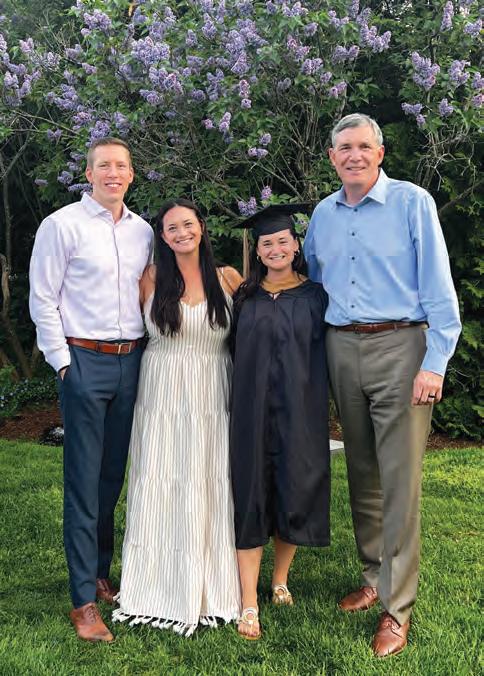
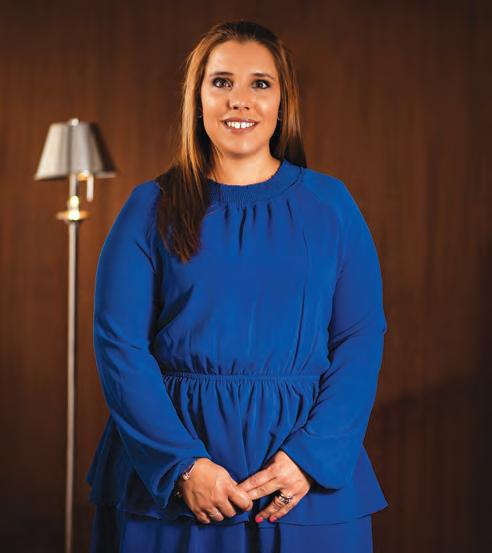
Connor Harbison MBA’22, founder of Atlas Urban Farms, recently installed a vertical wall panel at Pho Linh restaurant in Quincy, Massachusetts. “We’ll be growing Thai basil in preparation for their grand-reopening in September,” wrote Harbison, adding that Atlas Urban Farms “will be adding additional restaurants and crops to our portfolio as we continue to grow organically.” Harbison founded Atlas Urban Farms, where he designs and installs vertical farming systems, so that independent chefs can grow their own ingredients, save time and money, and deliver fresher meals. Atlas Urban Farms was the graduate track winner of the 2022 B.E.T.A. (Babson Entrepreneurial Thought & Action®) Challenge.
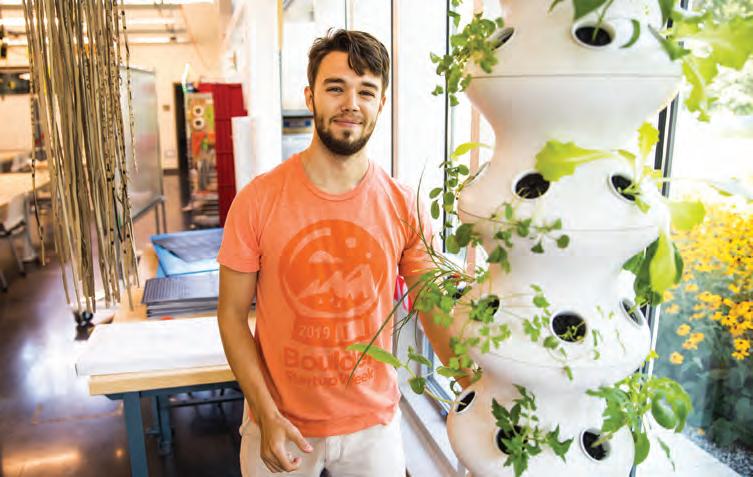 Mariana Robina MBA’13, senior vice president of investments and finance at Eagle Property Capital, was named Multifamily Executive magazine’s 2022 Rising Star.
earned the honor
employee at the vertically integrated real estate investment manager focused on the value-add multifamily
award ceremony in Las Vegas.
Mariana Robina MBA’13, senior vice president of investments and finance at Eagle Property Capital, was named Multifamily Executive magazine’s 2022 Rising Star.
earned the honor
employee at the vertically integrated real estate investment manager focused on the value-add multifamily
award ceremony in Las Vegas.
38 BABSON MAGAZINE / WINTER 2022–2023 NEWSNOTES ANDNODS
Catherine Crosby MBA’22 joined a proud family tradition when she graduated from Babson in the spring of 2022. Her father, Michael Crosby ’87, P’12 ’22, wrote that Catherine joined her sister, Carolyn Crosby Lavin ’12, and Carolyn’s husband, Thomas Lavin ’12, as Babson College graduates.
ALUMNI NEWS is in demand!
To accommodate news and photos from as many alumni as possible, please limit entries and photo captions to 50 words or less.
Babson Magazine has two requirements for Alumni News photos:
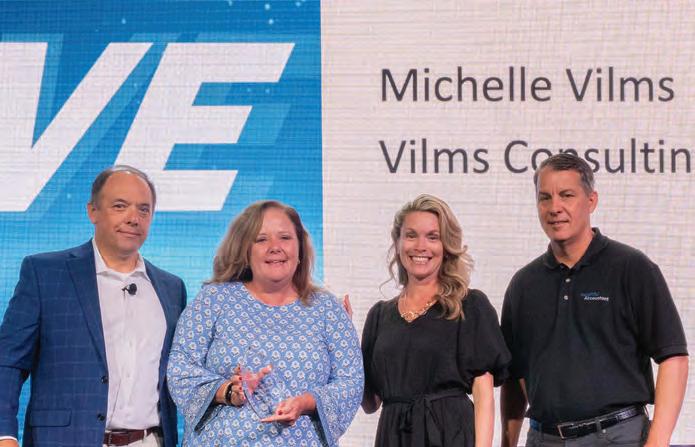
The submitting alum must be in the picture, and the image must be at least 4 x 6 inches at 300 dpi—no digital alterations, please. We can’t promise that all submitted photos will run, but we’ll include as many as possible.
Submit your latest news to the Alumni News Editor at babson.edu/nods
IN MEMORIAM
Daniel Blaisdell Ruggles III ’46, of Peabody, Massachusetts, July 21
Lawrence J. Geoghegan ’48, of Framingham, Massachusetts, April 19
Charles B.M. Douglas ’51, MBA’65, of Manchester, New Hampshire, April 26
Ira Ben Lehrich ’53, of Allentown, Pennsylvania, June 16
Roy William Klinzing ’54, of Bloomington, Illinois, June 2
Edwin Alan Smith ’57, MBA’74, P’86, of Springfield, Massachusetts, Aug. 27
Retired Army Lt. Col. Walter Joseph Diggles MBA’57, of Henrico, Virginia, March 1
Ralph Fearing Phipps ’58, of Peterborough, New Hampshire, June 18
Stanton Leroy Burgess Jr. ’59, of Boston, Massachusetts, Aug. 15
Stephen Mixter Smithwick ’59, of Falmouth, Maine, June 9
Mark Andrews Turner ’60, of Noank, Connecticut, May 8
Michael Yaffee ’60, of Wellesley, Massachusetts, Aug. 1
Donald Wayne Hanson MBA’60, of Attleboro, Massachusetts, May 20
Rufus S. Frost III ’61, of Marlborough, New Hampshire, July 21
Barry Jay ’61, of Boca Raton, Florida, May 22, 2021
Leonard Francis Lynch Jr. ’61, P’83, of Milford, Massachusetts, July 6
Gordon Alexander Riddell ’61, of Casa Grande, Arizona, Jan. 16
Don Ralph Ziegenbein ’61, MBA’62, of Lansing, Michigan, June 30
Mansfield M. Batchelder ’62, of Peachtree Corners, Georgia, June 2
Richard Shove Borden II ’63, of Westport, Massachusetts, July 9
Ira Horowitz ’63, of Dallas, Texas, April 15
William Alan Patterson ’63, of Cashiers, North Carolina, May 20
David Torrey Sylvester ’63, of New Orleans, Louisiana, June 8
Robert H. Schoenheit ’64, of Hilton, New York, Dec. 14, 2021
Philip J. McFate ’65, of Binghamton, New York, April 20
John E. Grandbois MBA’66, P’03, of Lebanon, New Hampshire, June 12
Ronald Harold Arthur MBA’67, of Wenham, Massachusetts, June 9, 2019
Retired Army Lt. Col. Ellis Rowe Morris MBA’67, of Roanoke, Alabama, July 20
Daniel Wayne Hoyt ’68, of Long Hill, Connecticut, May 10
Arthur Paul Landry II ’70, ’70, of Merrimack, New Hampshire, April 21
Robert S. Stevens ’71, of Camp Hill, Pennsylvania, July 5
William F. Flannery Jr. MBA’71, of Boston, Massachusetts, July 30
Gregory Yergatian MBA’71, of Milford, Massachusetts, April 19
Jeffrey Stephan Frank ’72, MBA’77, of Brockton, Massachusetts, July 30
Allen Gilbert ’72, of Kensington, New Hampshire, May 5
Paul H. Visco ’72, of Waltham, Massachusetts, July 6
Donald Richard Bloom MBA’72, of Albuquerque, New Mexico, May 5
James Michael Conway MBA’72, of Manchester-by-the-Sea, Massachusetts, May 23
John Warren Conkling MBA’74, of Boston, Massachusetts, July 3
John Leonard Gerweck ’75, of Red Bank, New Jersey, June 3
James Anastasi MBA’75, of Easton, Massachusetts, July 19
Richard Gerard Antonellis MBA’75, of West Warwick, Rhode Island, March 31
David Irwin Porter MBA’75, of Norway, Maine, July 18
Carmine A. Zamarro MBA’75, of Worcester, Massachusetts, June 20
Robert Alfred Toto MBA’77, of Lawrence, Massachusetts, June 3
William Thomas Hutch MBA’78, of Marlborough, Massachusetts, May 5
Alan Paul Siegel MBA’79, of Easton, Massachusetts, May 8
Edward J. Girvan Jr. ’81, of Boston, Massachusetts, Aug. 12
Karl Philip Ekonomy MBA’82, of Southlake, Texas, June 25
Lee Warren Young ’83, of Edmond, Oklahoma, May 22
Rachel Coward Brown ’84, of Medfield, Massachusetts, May 30
William E. Croteau ’85, of Novato, California, June 13
Joan M. McCann MBA’90, of Wellesley, Massachusetts, July 1
William Haynes Kelly Jr. MBA’96, of Melrose, Massachusetts, April 21
Mikhail A. Sirota MBA’97, of San Francisco, California, March 10
Daniel J. Curley ’98, of Waltham, Massachusetts, June 10
James J. Lewellis MBA’05, of Pittsburgh, Pennsylvania, June 7
Michelle Vilms MBA’01, CEO of Vilms Consulting, was named a 2022 100 Top ProAdvisor in July by Insightful Accountant, an independent news source for accountants advising small businesses. Vilms also was named the Top QuickBooks Online ProAdvisor for 2022. Insightful Accountant said it tapped Vilms as the highest-ranking QuickBooks Online advisor based on her training, certifications, years of experience, client reviews, and peer evaluations.
WINTER 2022–2023 / BABSON MAGAZINE 39
The Business of Building Community

A look at entrepreneurial leaders shaped by their Babson College experience.
BEN SMITH ’16 BRINGS PEOPLE TOGETHER THROUGH COMMUNAL LIVING IN BROOKLYN
e may have grown up in a supportive, loving environment, but Ben Smith ’16 admits that being the adopted Chinese son of two American men wasn’t always easy. “Why do you have two dads?” was one question he often heard in school. “Why don’t you look like them?” was another.
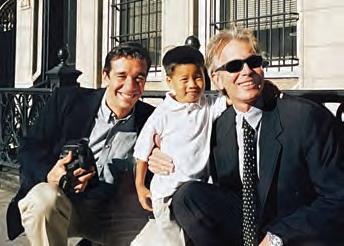
In time, he learned to appreciate what made him different, and he also grew intrigued by the differences he saw in others. He had a curiosity about people. “I always had this fascination of learning about other people and their backgrounds,” he says. “It has been a central theme throughout my life.”
Today, Smith is in the business of creating connections and community. He is the founder and operator of Goal House, a communal living space located in a ve- oor townhouse in Brooklyn, New York. The atmosphere in the house is not unlike that of a college dorm, only for adults. The 20 people in the house frequently socialize together, playing board games, grabbing coffee, and watching TV. Every Sunday, they take turns cooking dinner for what is called “Sunday Family Dinner.”
Goal House essentially creates a little community in the midst of a big city. Most of its residents are new to New York. “It is easy to feel like a sh out of water in New York,” Smith says. “If you feel lonely in this big city, the experience can be hard.”
While at Babson, Smith became interested in the fraternity and support of communal living when he traveled
to Europe and stayed in hostels for the rst time. He was amazed by how the bunks were lled with people from around the world. “I became obsessed with this idea of a physical space being a great catalyst to bring people together,” he says.
Goal House is actually his second foray into creating co-living spaces. In 2017, he co-founded Tribe, which aimed to create houses where people with similar interests (artists, musicians, entrepreneurs, tech workers) could live together.
On the face of it, Tribe proved successful during Smith’s time there, opening eight houses in New York and a converted hotel space in San Francisco. But, as the company grew, the communal aspects waned. Application numbers were up, but more so because of the exible convenience of Tribe’s housing rather than the communal
bene ts that Smith was passionate about. “Community is really hard to scale,” Smith says. “We couldn’t keep growing and continue the community efforts we wanted to maintain.”
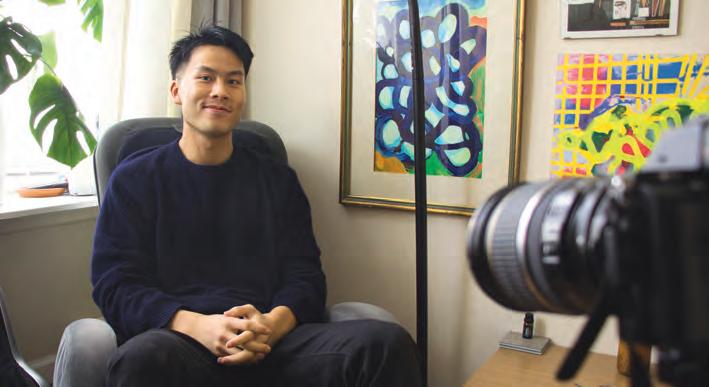
Eventually, Smith left Tribe and started the much smaller Goal House, a vibrant community that he also calls home. While his responsibilities as the house’s operator are sometimes demanding, they still leave him time for personal projects. On TikTok (@BecomingBen), he has gained a large following for his videos about growing up in a nontraditional family.
Smith won’t live in Goal House forever, but, for now, a life spent in the community suits him. “It has worked out pretty well,” he says.
— John Crawford
Raised by his two dads (right), Ben Smith ’16 always has had a curiosity about other people.
BEN SMITH PHOTO: MICHELLE MERCEDE
40 BABSON MAGAZINE / WINTER 2022–2023 ENTREPRENEURIAL LEADERSHIPIN ACTION
H
I had no idea how much ET&A (Entrepreneurial Thought & Action®) would influence the way I think. The education has helped me identify and quantify problems in a way that I could never do before, making the path forward much clearer.”
REIMAGINING The Part-Time MBA for Working Professionals
Achieve your personal goals without sacri cing your career momentum. Choose between Babson’s Part-Time Flex MBA and Part-Time Online MBA to earn an education that gives you the problem-solving mindset, expansive network, and tangible action plan you need to take the next step in your career, with the schedule and format that work best for you.
Already a Babson alum? Take advantage of a 20% Lifelong Learners grant applicable toward all Babson graduate programs.
babson.edu/reimagine
— Nick Gallagher Part-Time MBA’22 Regional Accounts Manager, James Hardie Building Products, Chicago












































































Give by phone: 781-239-4393 Give by stock/wire Give by check Give online Make a planned gift Become a recurring donor Match my gift Give through a Donor-Advised Fund MANY WAYS TO GIVE. ONEBABSON. Every Person. Any Amount. Every Year. babson.edu/waystogive Babson Park, MA 02457-0310














 Babson students visit Mercedes-Benz Stadium in Atlanta as part of the Good Company, Good Game course.
Babson students visit Mercedes-Benz Stadium in Atlanta as part of the Good Company, Good Game course.

















 PHOTO: KEVIN LILES
PHOTO: KEVIN LILES

















 PHOTO: MICHAEL QUIET
PHOTO: MICHAEL QUIET

















 By Kara Baskin
By Kara Baskin
 PHOTO: MARK MANNE
PHOTO: MARK MANNE










































 Audrey Klebanow ’93 married William McGann ’93 on May 12 in Park City, Utah. The couple has five children, as well as four dogs, seven alpacas, three donkeys, chickens, ducks, and goats. Fellow classmate Stephen Paquelet ’93 attended the wedding celebration.
Craig R. Benson ’77, H’03, who serves on the Babson Board of Trustees, welcomed a new granddaughter, Ava Michelle, who was born May 19.
Audrey Klebanow ’93 married William McGann ’93 on May 12 in Park City, Utah. The couple has five children, as well as four dogs, seven alpacas, three donkeys, chickens, ducks, and goats. Fellow classmate Stephen Paquelet ’93 attended the wedding celebration.
Craig R. Benson ’77, H’03, who serves on the Babson Board of Trustees, welcomed a new granddaughter, Ava Michelle, who was born May 19.




 Tahira Adatia ’10 was listed in Deloitte Canada’s 2022 partner class in July.
Employees in the group, according to Deloitte Canada’s announcement, are “dedicated professionals who have clearly demonstrated that they possess the skills, dedication, and motivation to grow their careers and help our organization flourish in the years ahead.”
new partner class reflects hard-earned recognition for leaders who have demonstrated outstanding performances and brought Deloitte’s shared values and purpose to life.
Tahira Adatia ’10 was listed in Deloitte Canada’s 2022 partner class in July.
Employees in the group, according to Deloitte Canada’s announcement, are “dedicated professionals who have clearly demonstrated that they possess the skills, dedication, and motivation to grow their careers and help our organization flourish in the years ahead.”
new partner class reflects hard-earned recognition for leaders who have demonstrated outstanding performances and brought Deloitte’s shared values and purpose to life.

 Ben Kravitz ’14 married Allison Windsor ’16 on August 5. While at Babson, Kravitz played hockey and Windsor played lacrosse. The pair was surrounded by several former Babson teammates and college friends at the summer ceremony.
Ben Kravitz ’14 married Allison Windsor ’16 on August 5. While at Babson, Kravitz played hockey and Windsor played lacrosse. The pair was surrounded by several former Babson teammates and college friends at the summer ceremony.

 Jon Dainesi ’15 married Ella Overholt ’15 on June 4 at the Snowpine Lodge in Alta, Utah. More than 20 Babson alumni attended the wedding. From left to right: Kyle Bissell ’17, Anton Pronichenko ’17, Nick DeMartino ’15, Kyle Morrisey ’13, Taylor Welsh ’16, Alex Prentice ’15, Billy Affsa ’15, Katie Hunt ’15, Graham Anderson ’15, Dainesi (groom), Overholt (bride), Phil Turpin ’15, Christian Gordon ’14, Jared Silber ’15, Ryan Diplock ’15, Somia Farid Silber ’15, Victoria McKay ’15, Carter Dowd ’16, Danielle Brasher ’15, and Kate Began ’15.
Jon Dainesi ’15 married Ella Overholt ’15 on June 4 at the Snowpine Lodge in Alta, Utah. More than 20 Babson alumni attended the wedding. From left to right: Kyle Bissell ’17, Anton Pronichenko ’17, Nick DeMartino ’15, Kyle Morrisey ’13, Taylor Welsh ’16, Alex Prentice ’15, Billy Affsa ’15, Katie Hunt ’15, Graham Anderson ’15, Dainesi (groom), Overholt (bride), Phil Turpin ’15, Christian Gordon ’14, Jared Silber ’15, Ryan Diplock ’15, Somia Farid Silber ’15, Victoria McKay ’15, Carter Dowd ’16, Danielle Brasher ’15, and Kate Began ’15.













 Felipe Haristoy-Lavin MBA’08: See 1980, above.
Neil Geary MBA’01 was hired by The Procopio Companies to serve as the company’s first chief financial officer. Geary, who has more than 25 years of experience in real estate development and financial management, will be responsible for the financial oversight of Procopio’s rapidly expanding portfolio of national developments.
Felipe Haristoy-Lavin MBA’08: See 1980, above.
Neil Geary MBA’01 was hired by The Procopio Companies to serve as the company’s first chief financial officer. Geary, who has more than 25 years of experience in real estate development and financial management, will be responsible for the financial oversight of Procopio’s rapidly expanding portfolio of national developments.


 Mariana Robina MBA’13, senior vice president of investments and finance at Eagle Property Capital, was named Multifamily Executive magazine’s 2022 Rising Star.
earned the honor
employee at the vertically integrated real estate investment manager focused on the value-add multifamily
award ceremony in Las Vegas.
Mariana Robina MBA’13, senior vice president of investments and finance at Eagle Property Capital, was named Multifamily Executive magazine’s 2022 Rising Star.
earned the honor
employee at the vertically integrated real estate investment manager focused on the value-add multifamily
award ceremony in Las Vegas.





